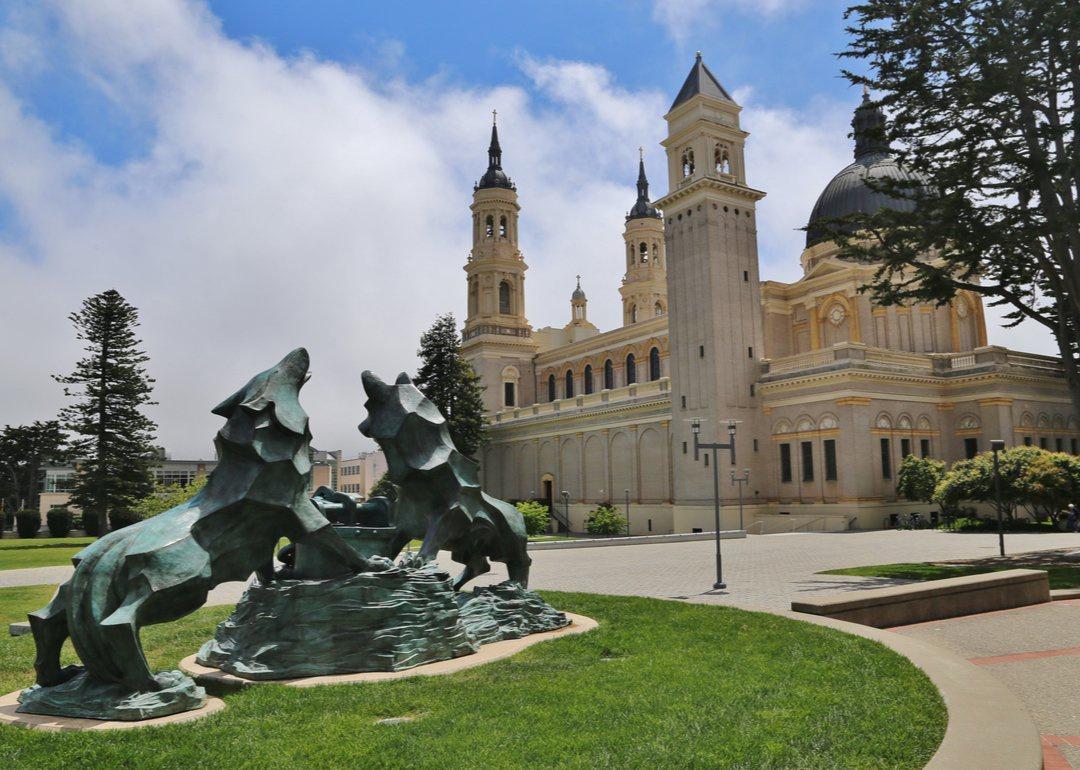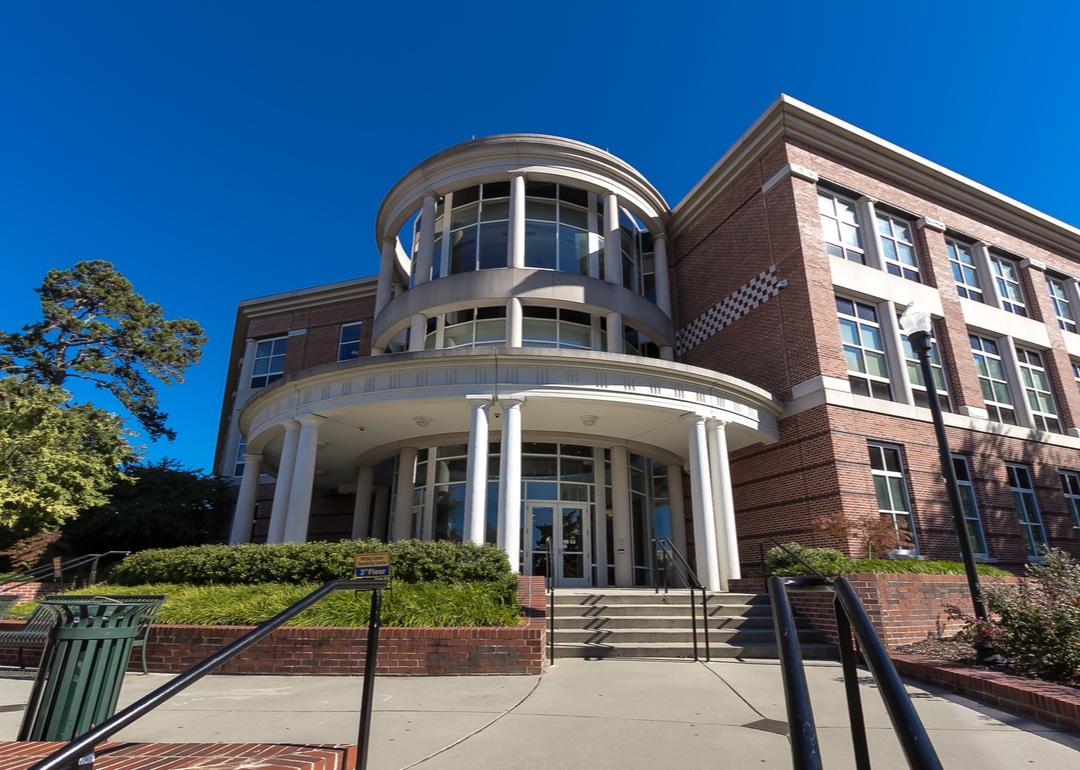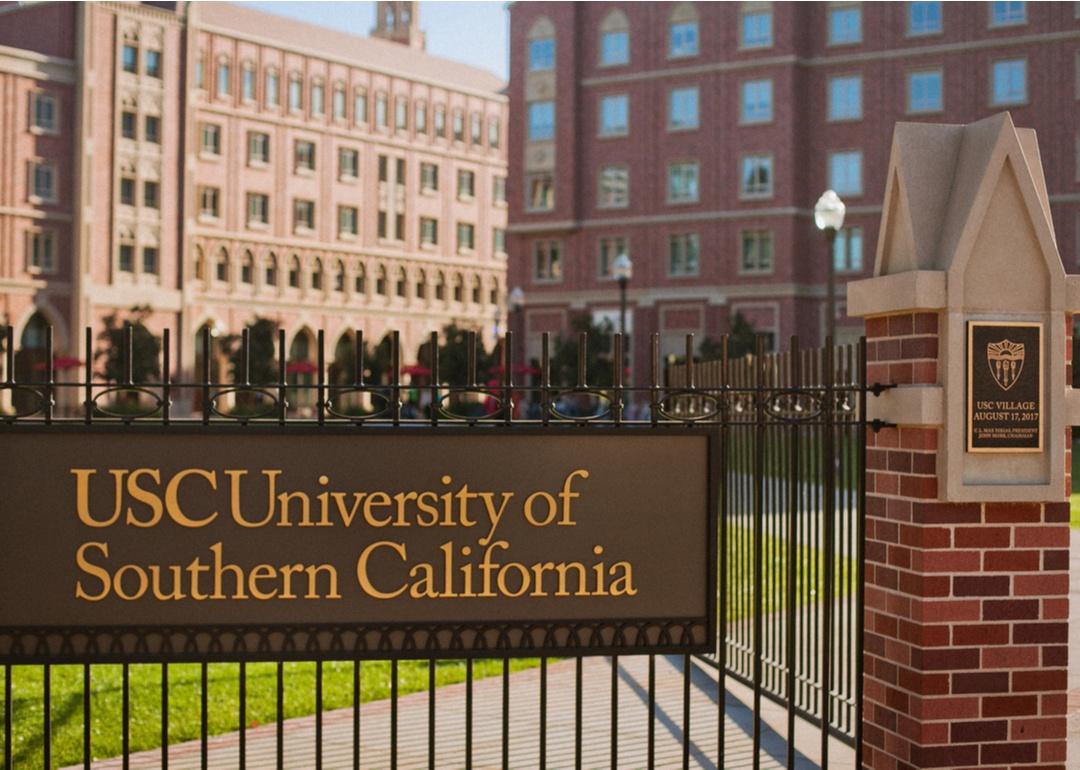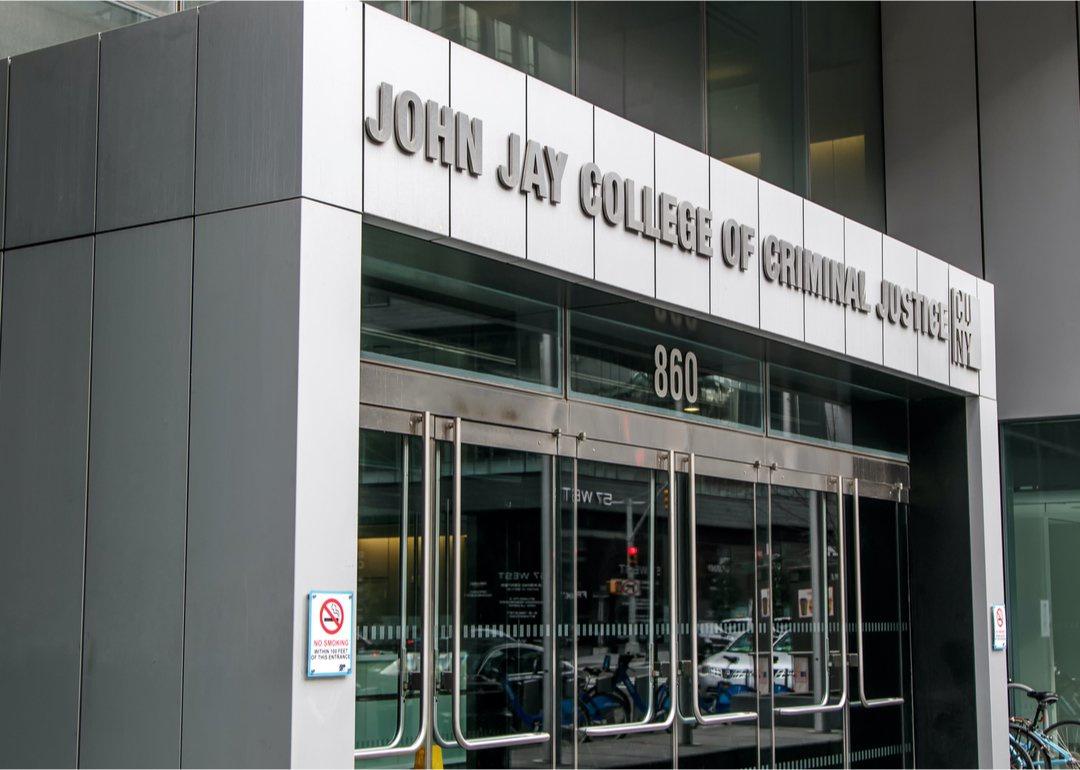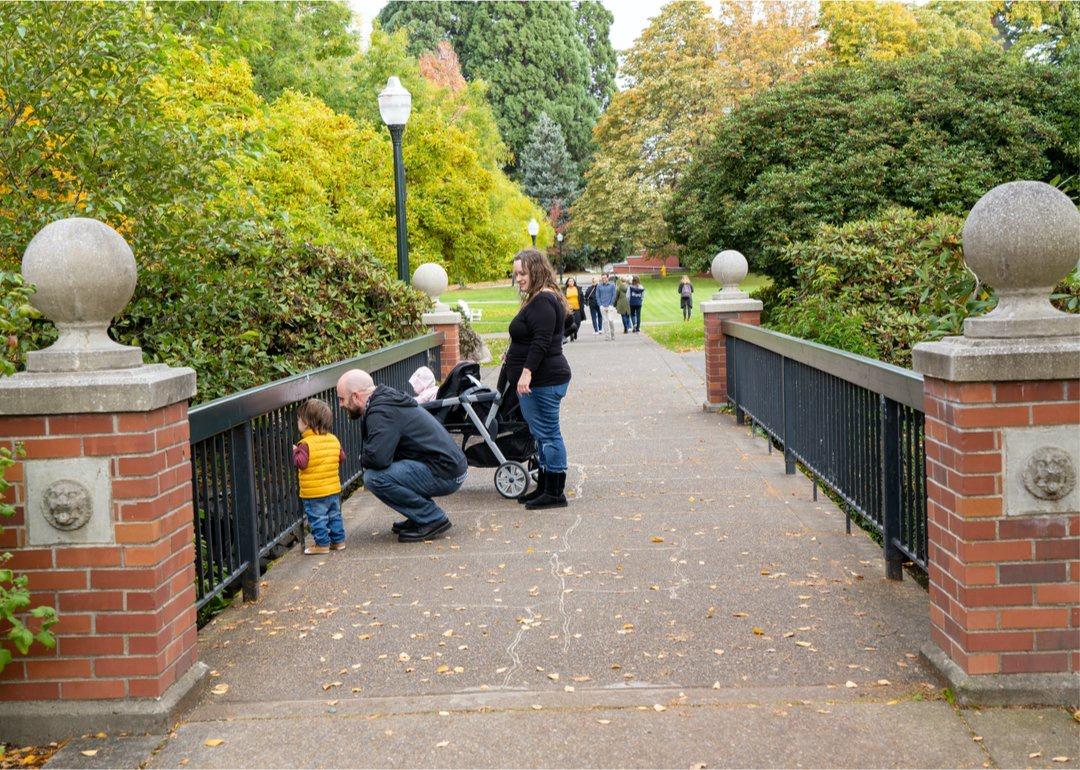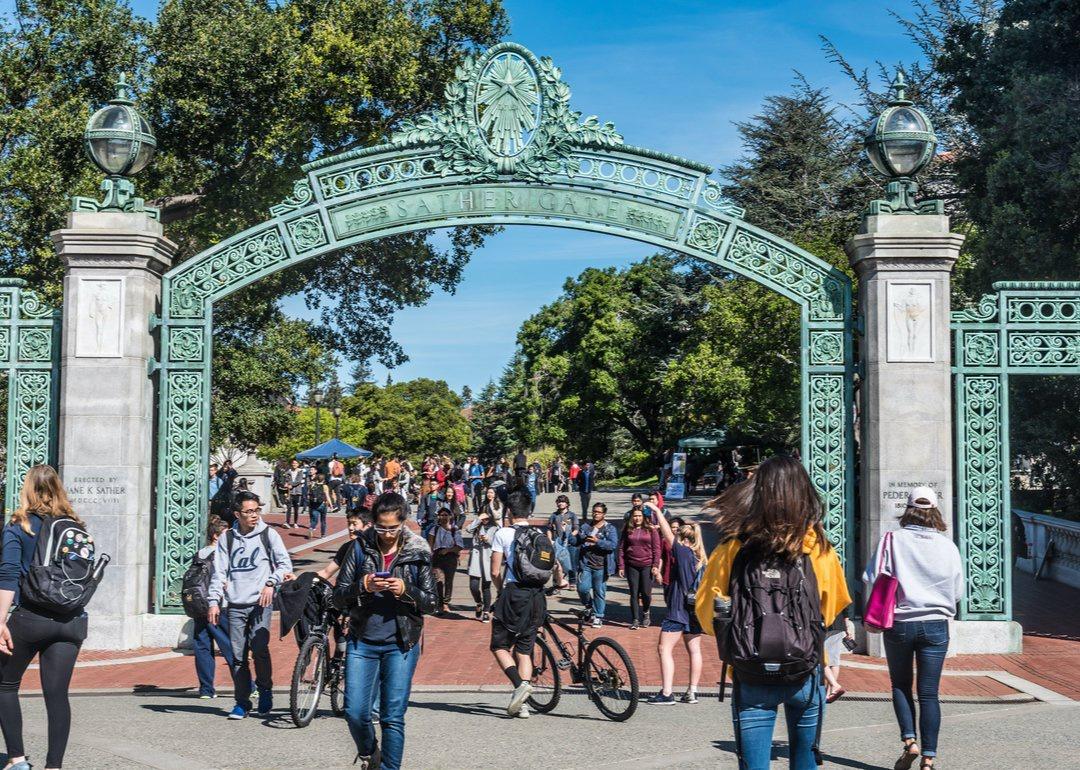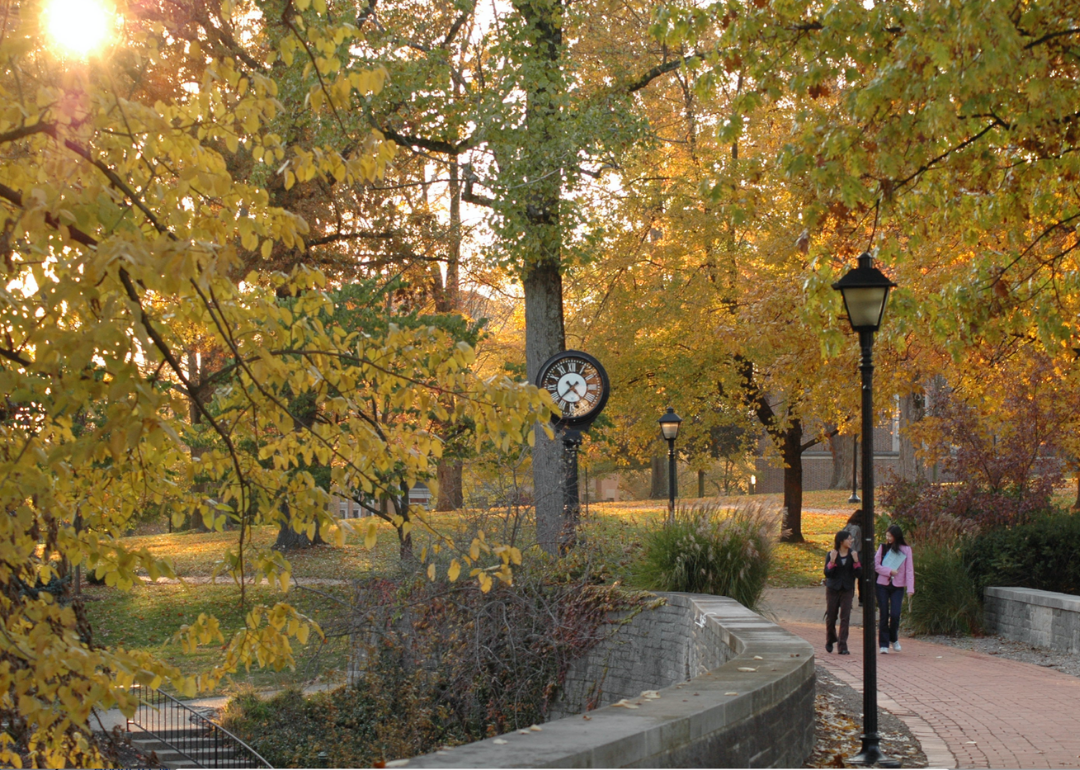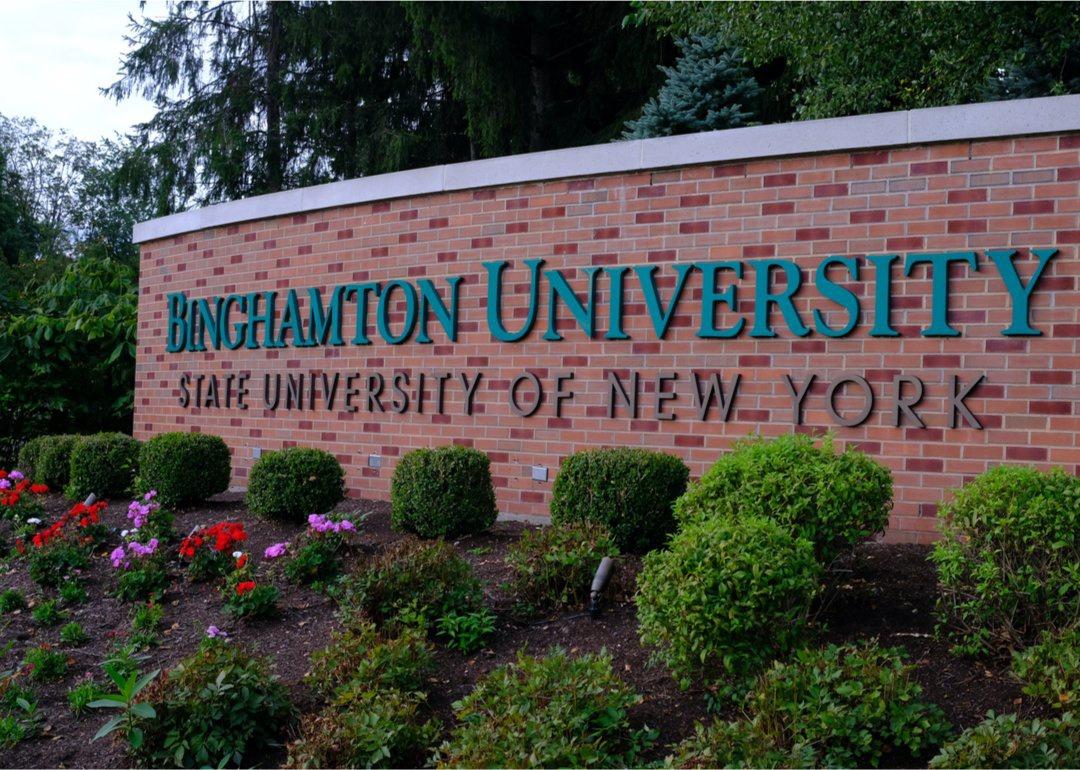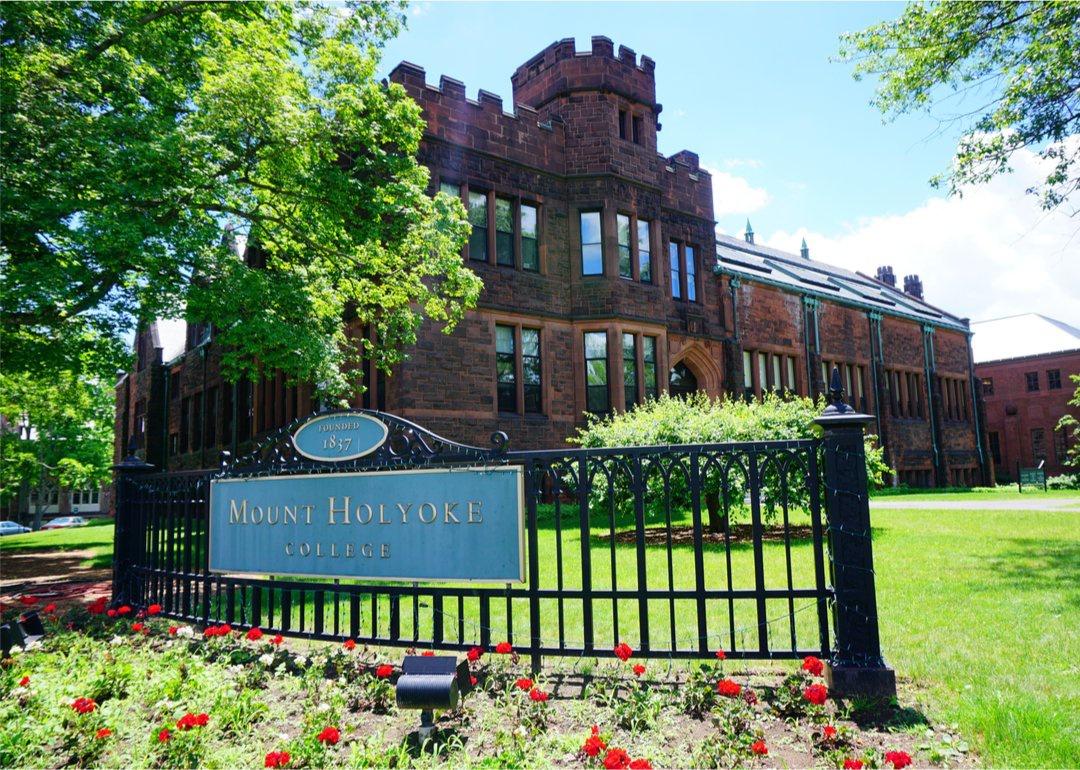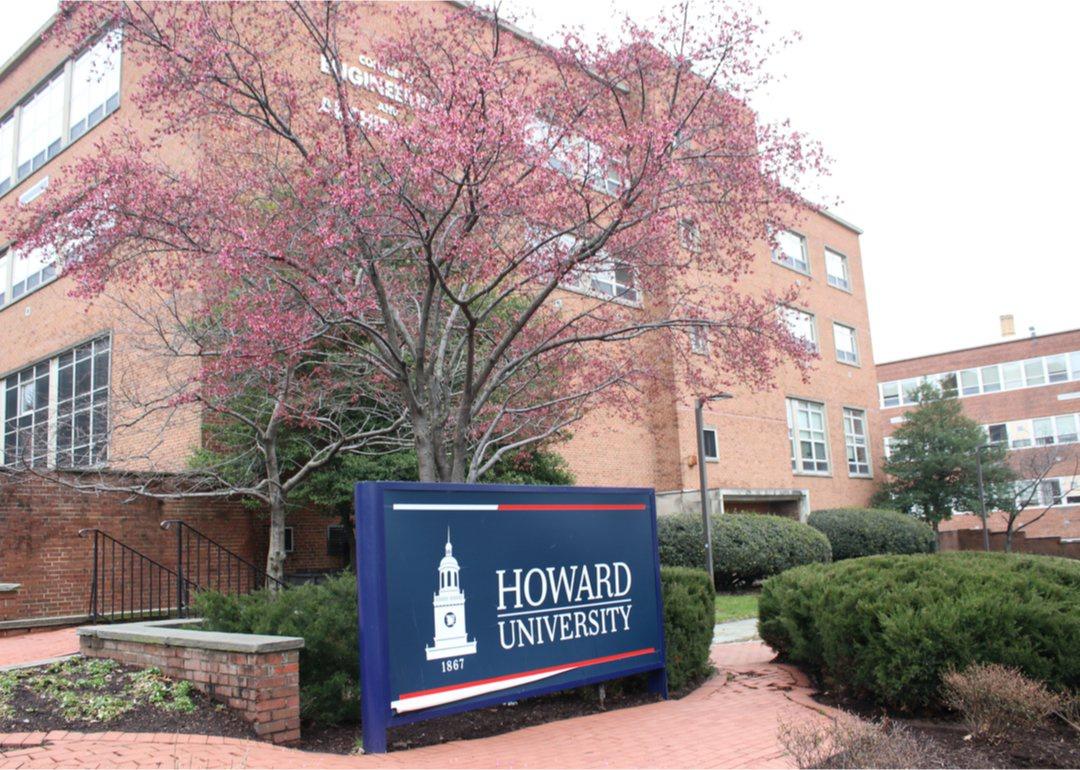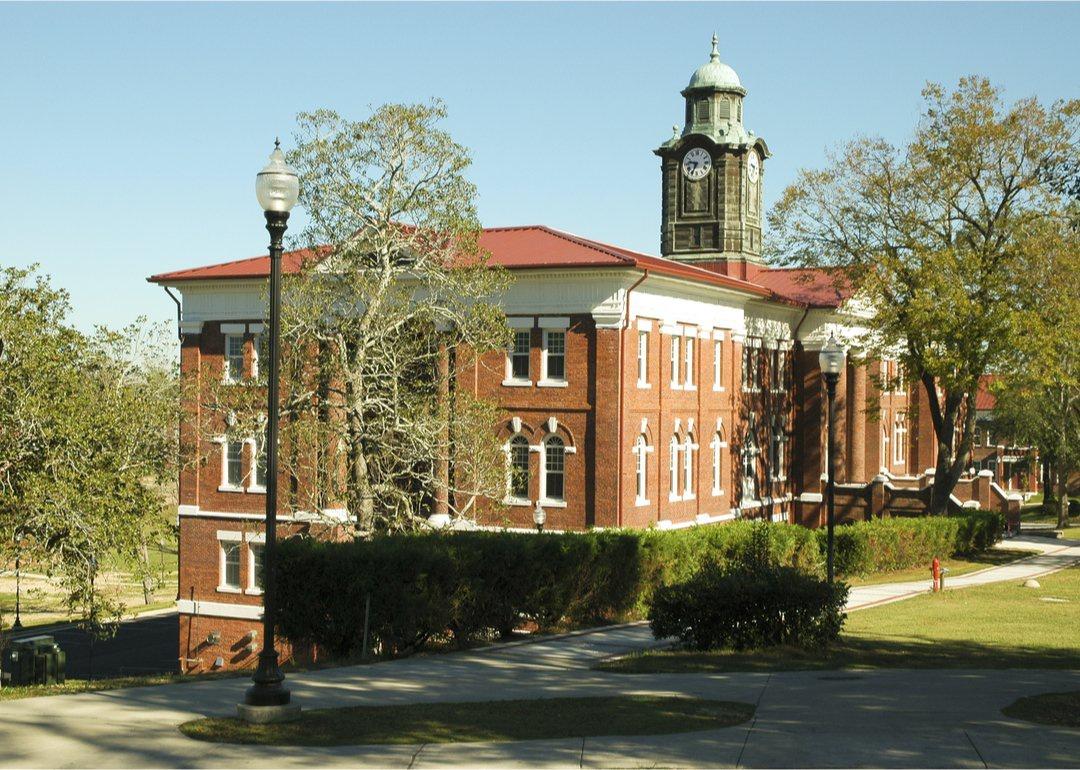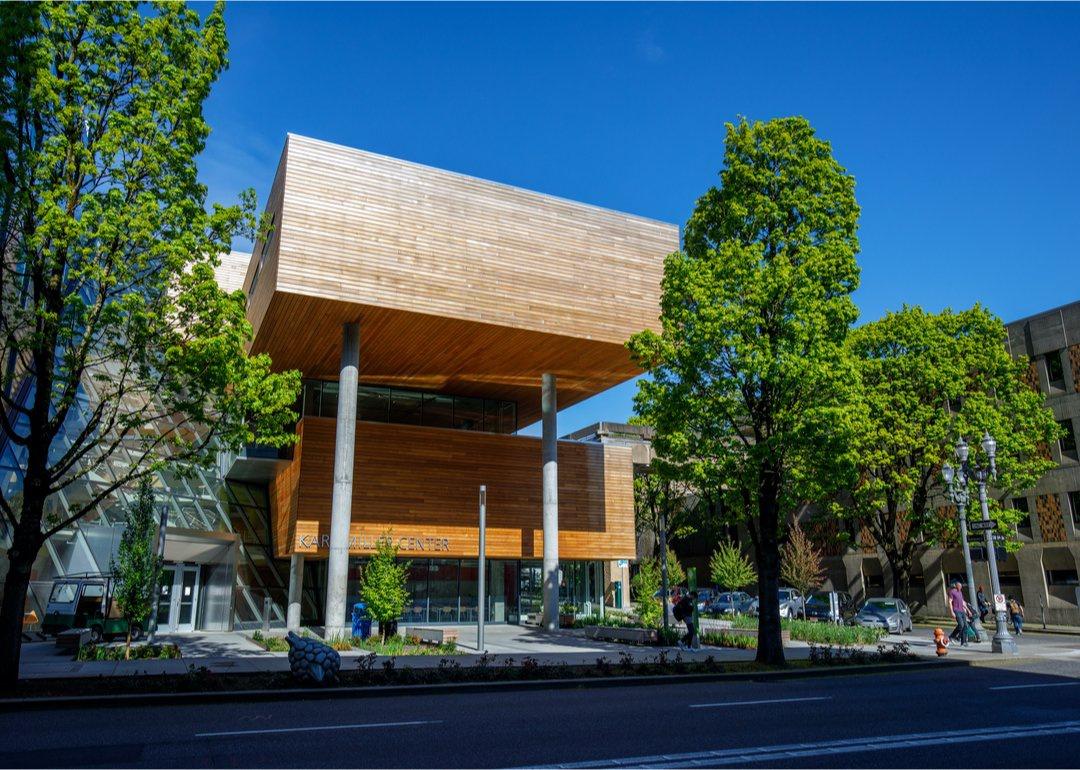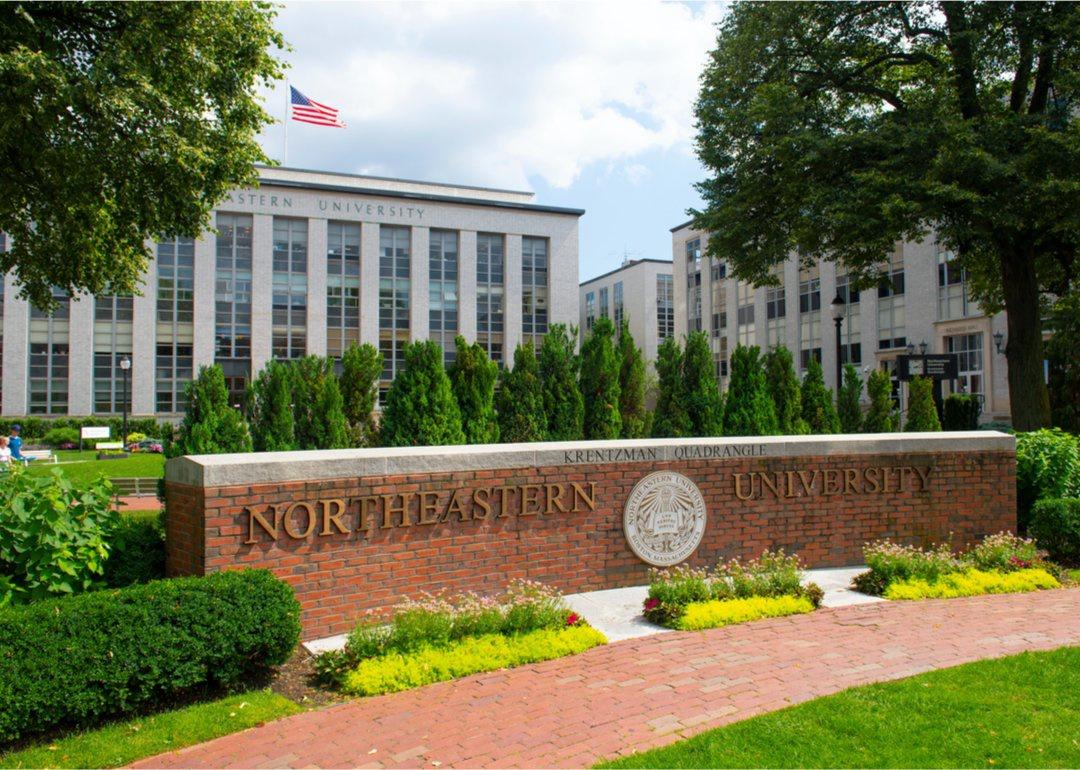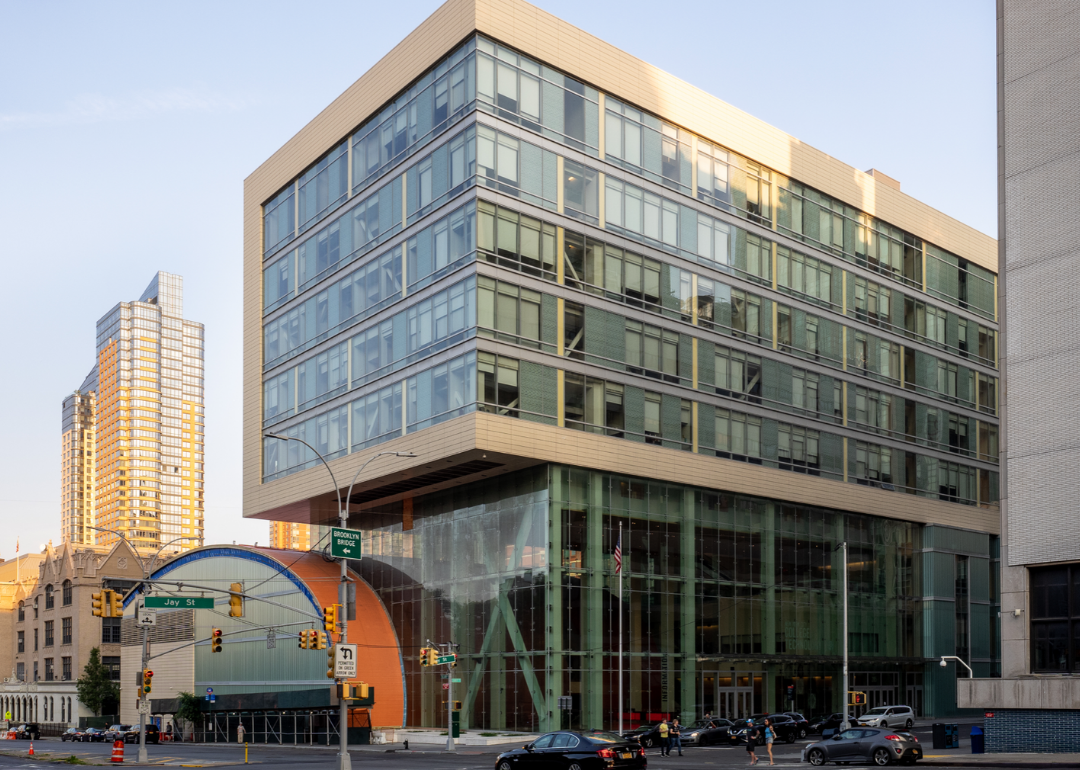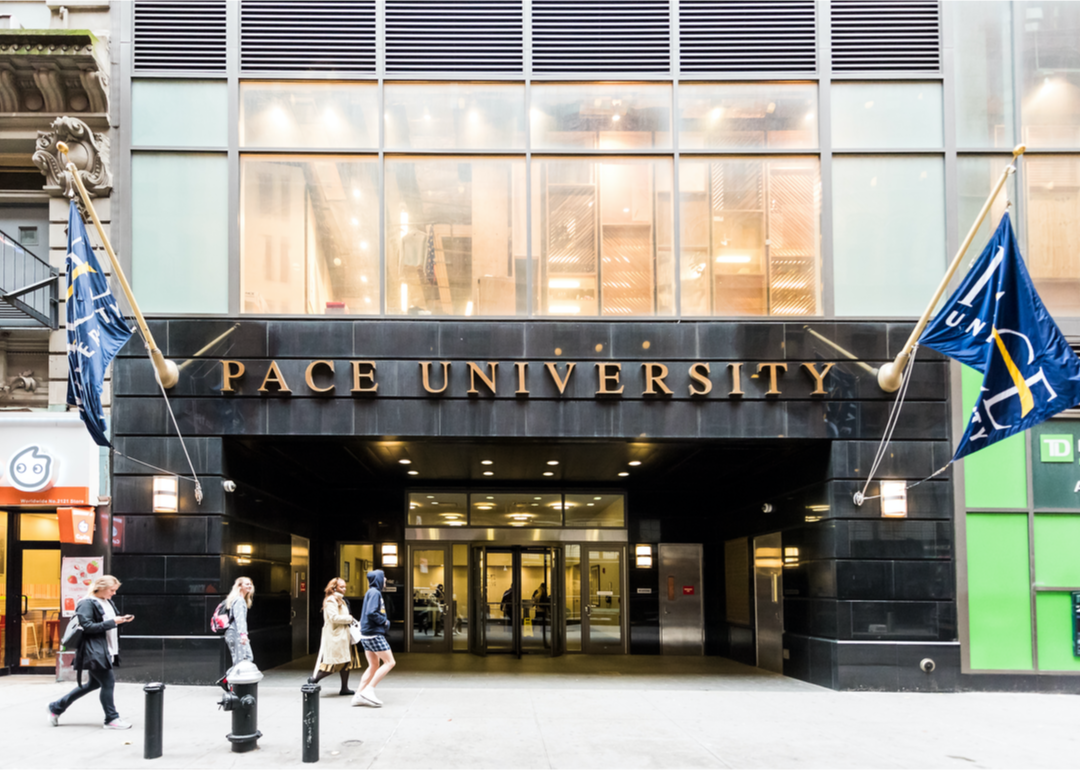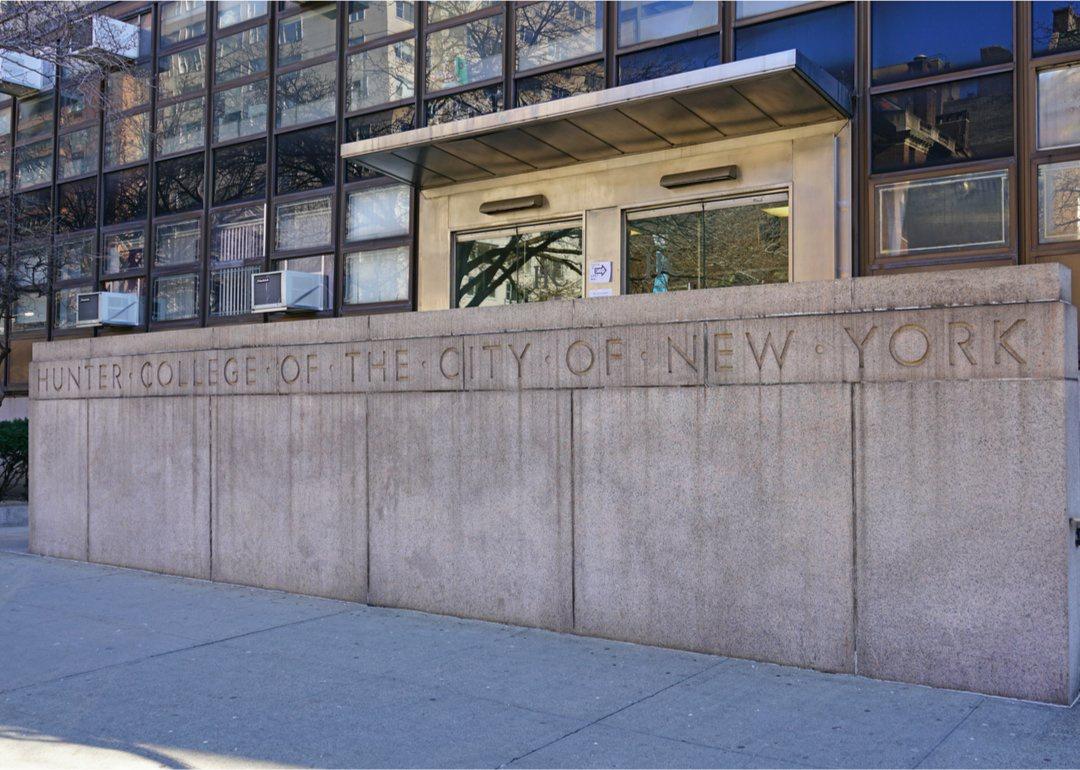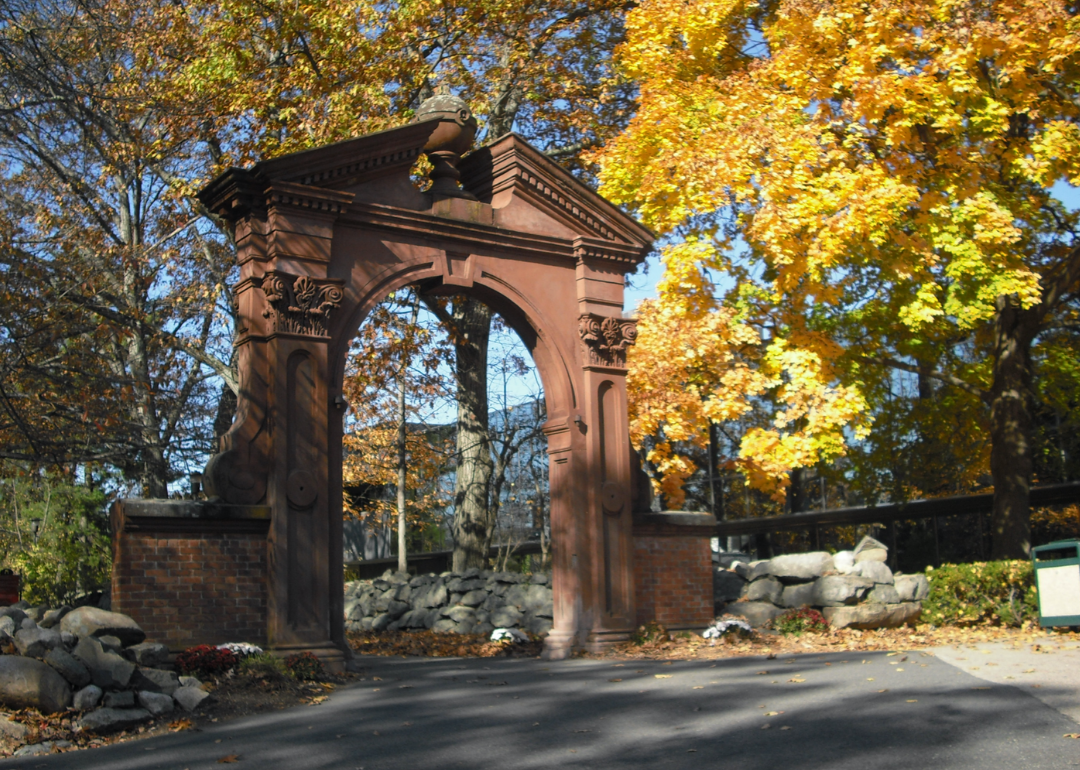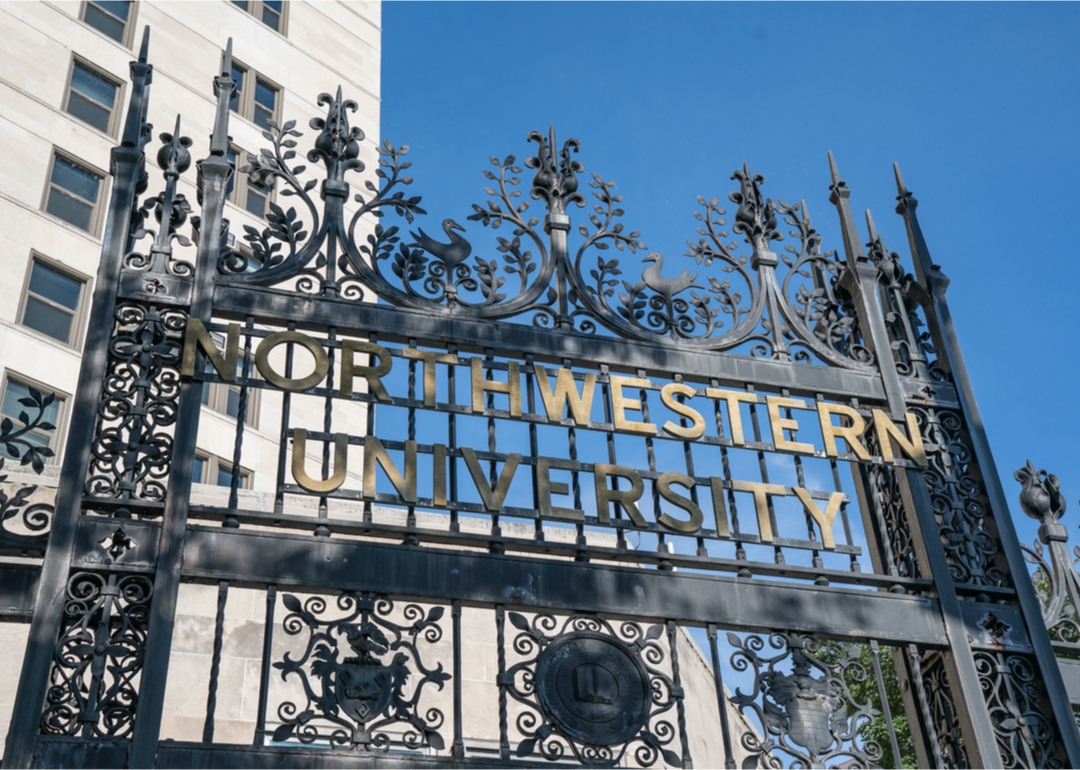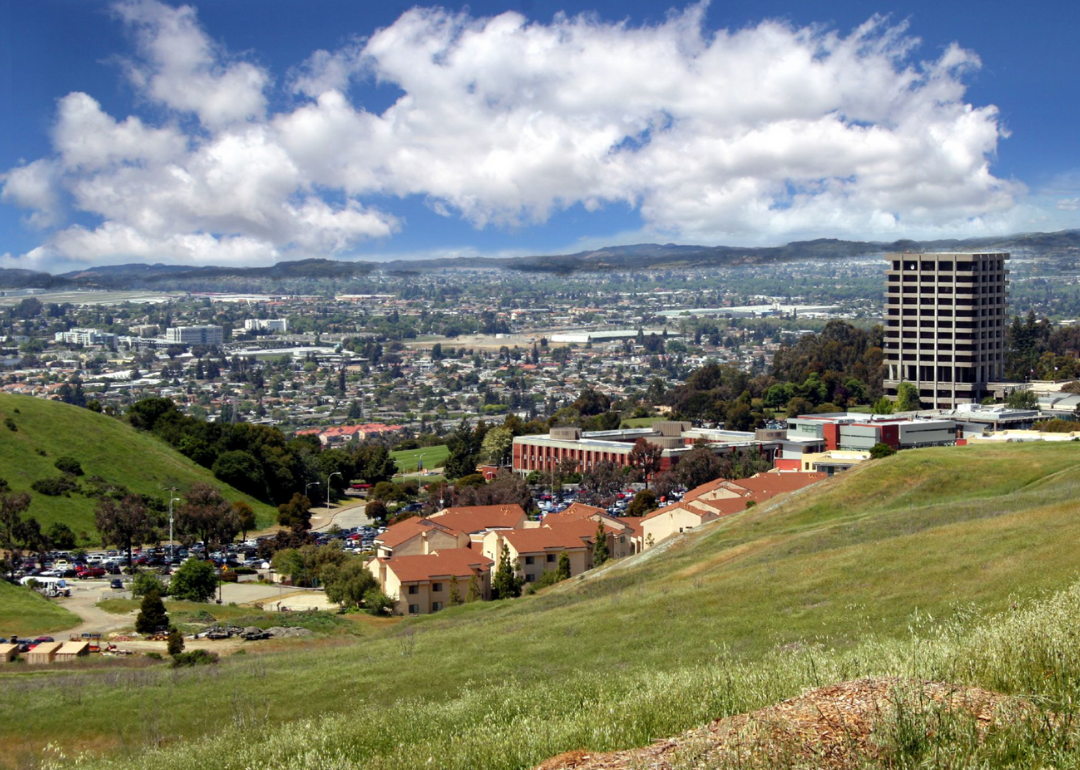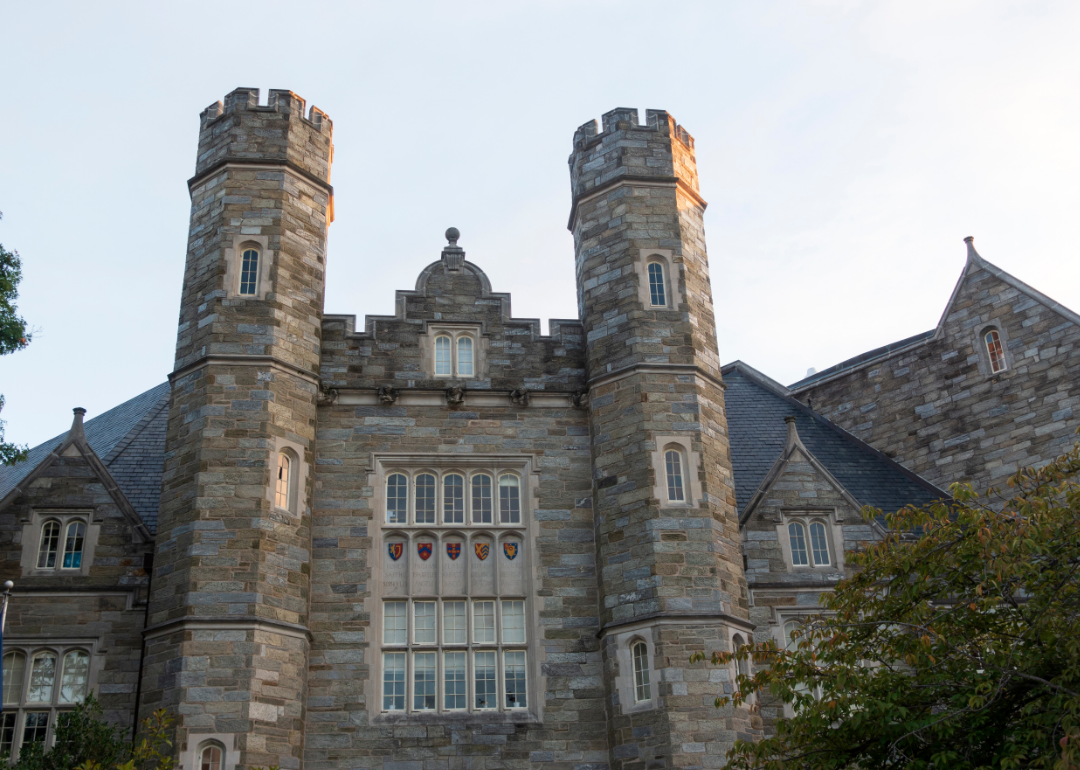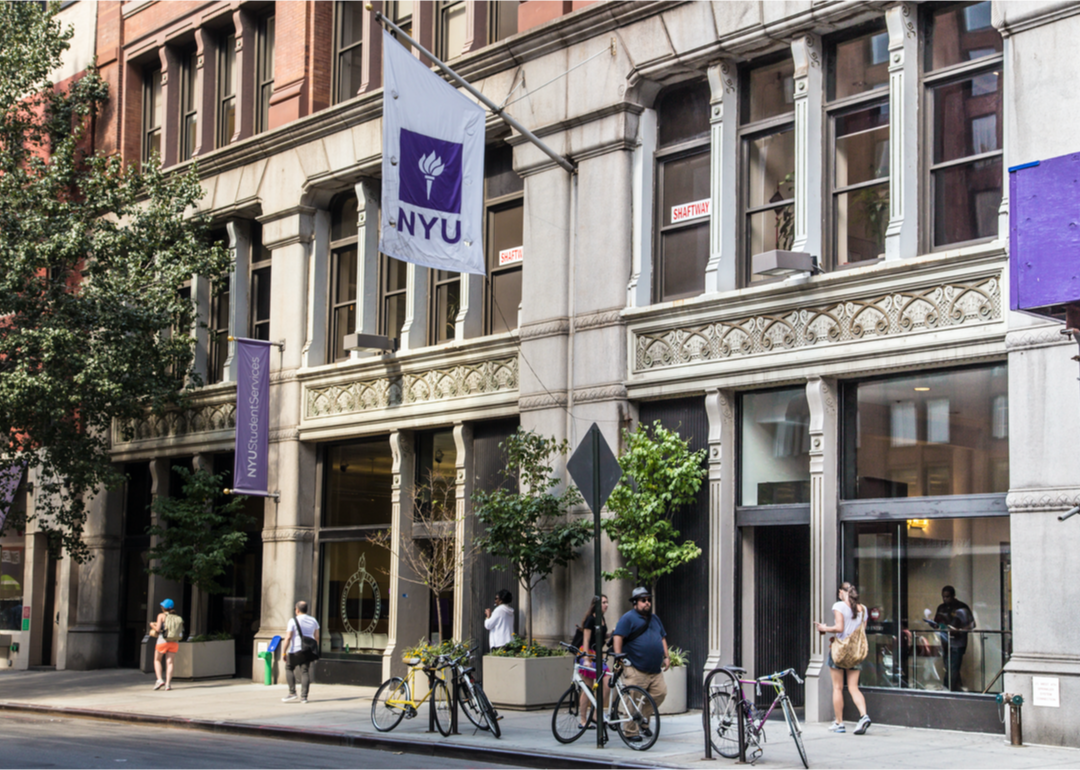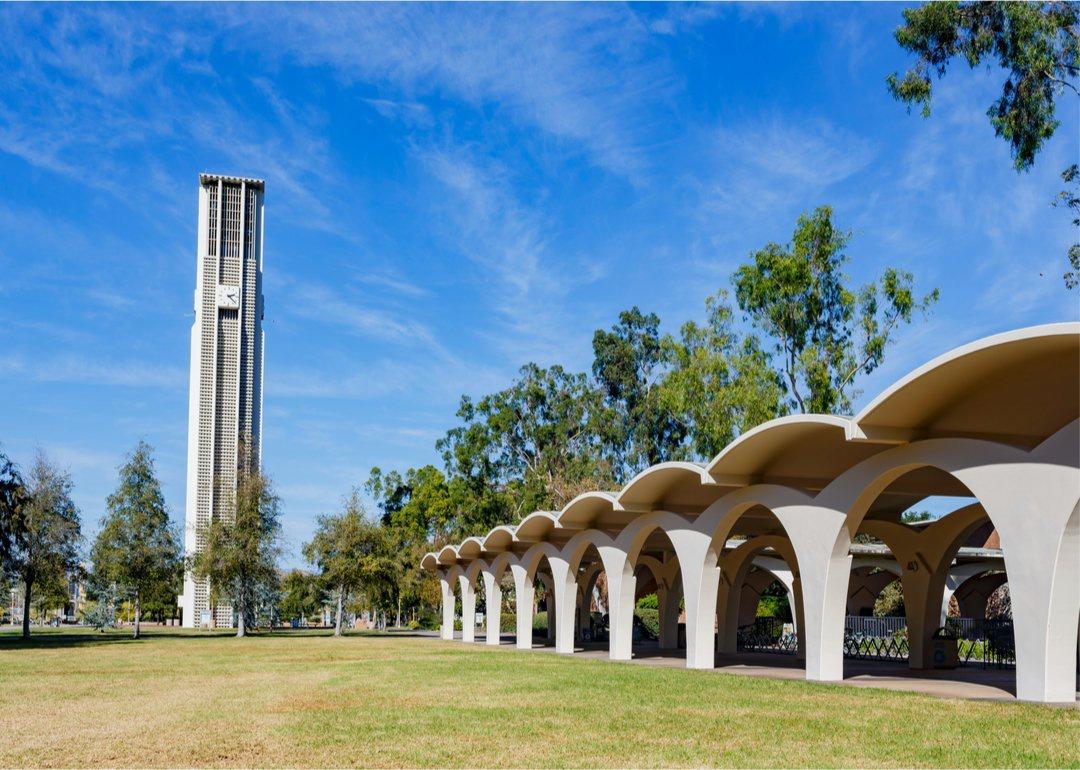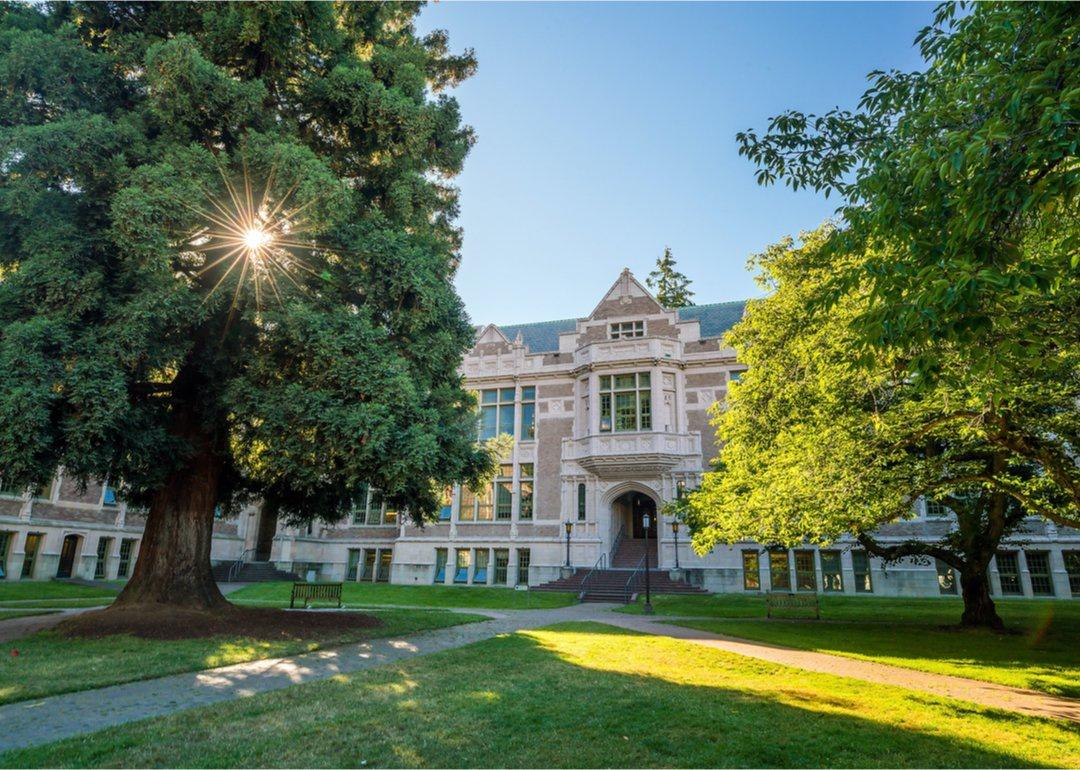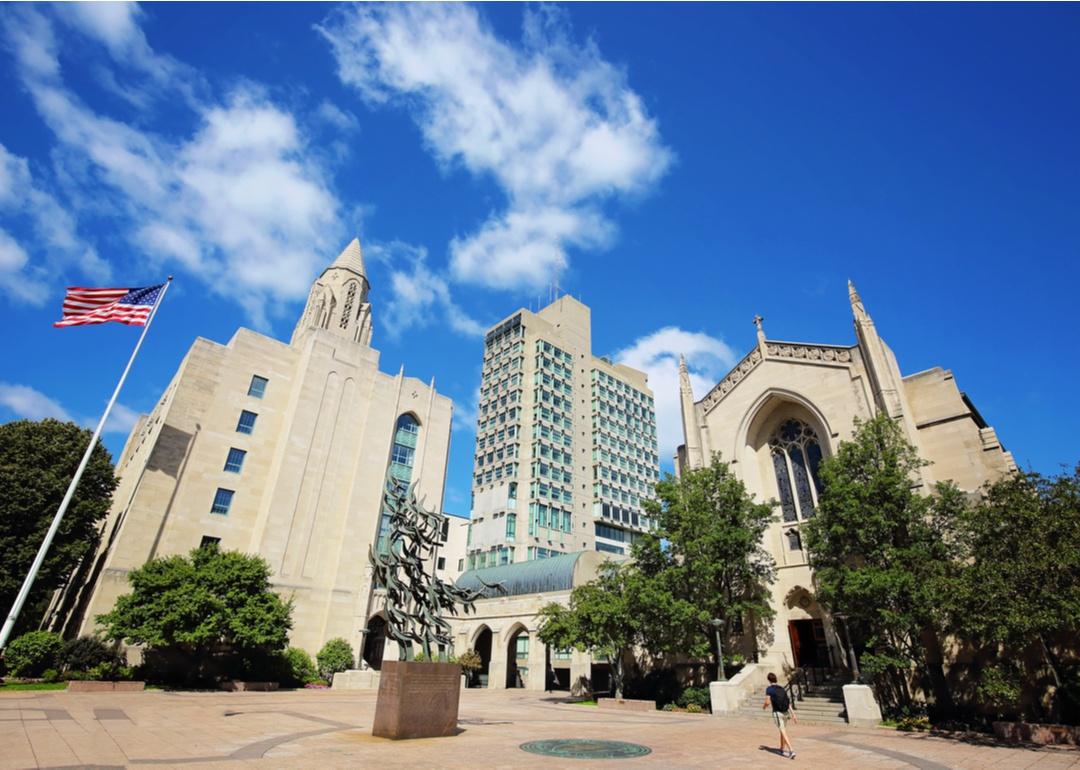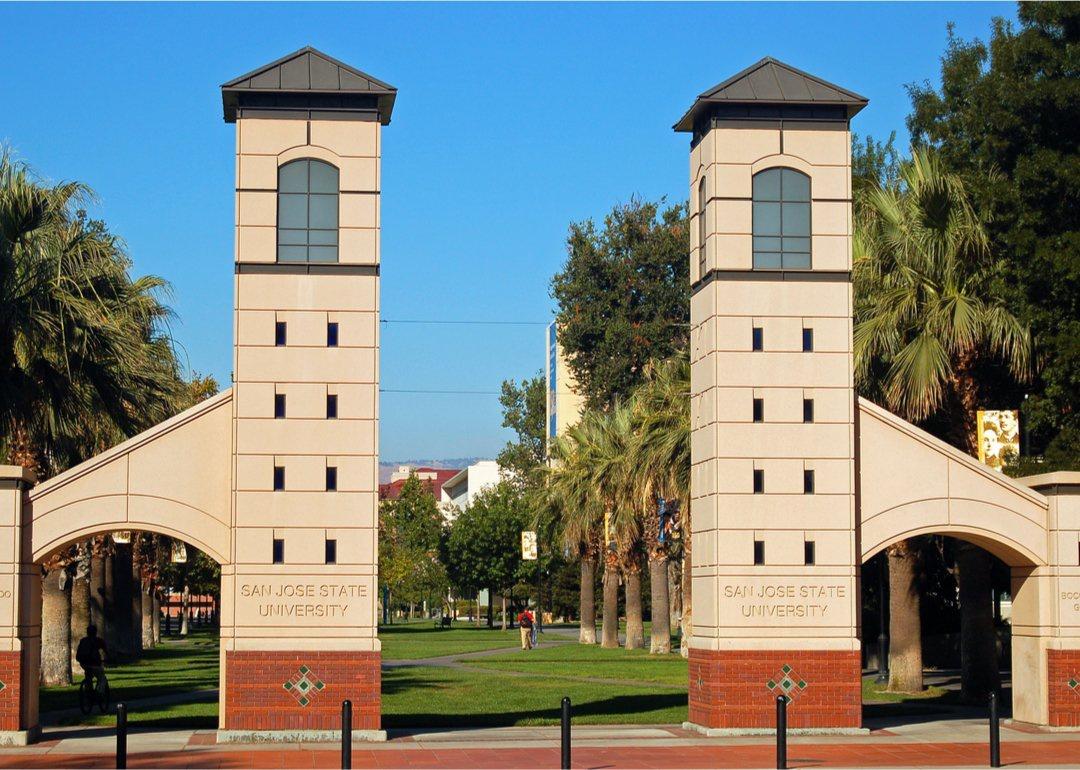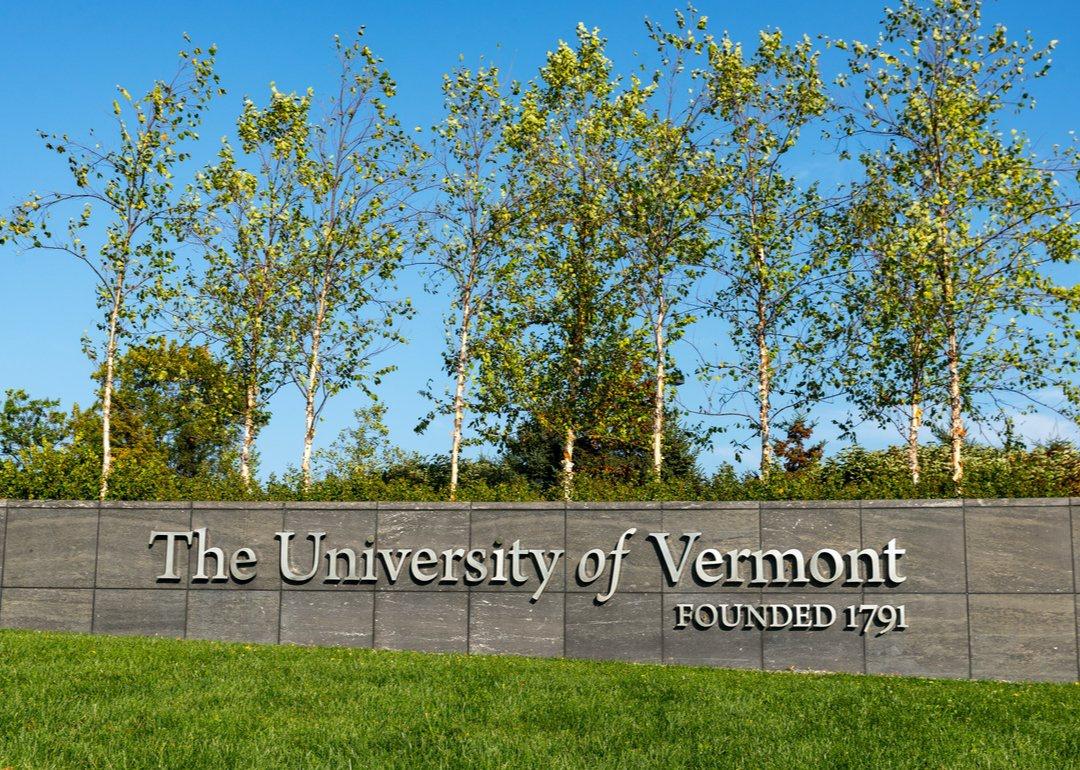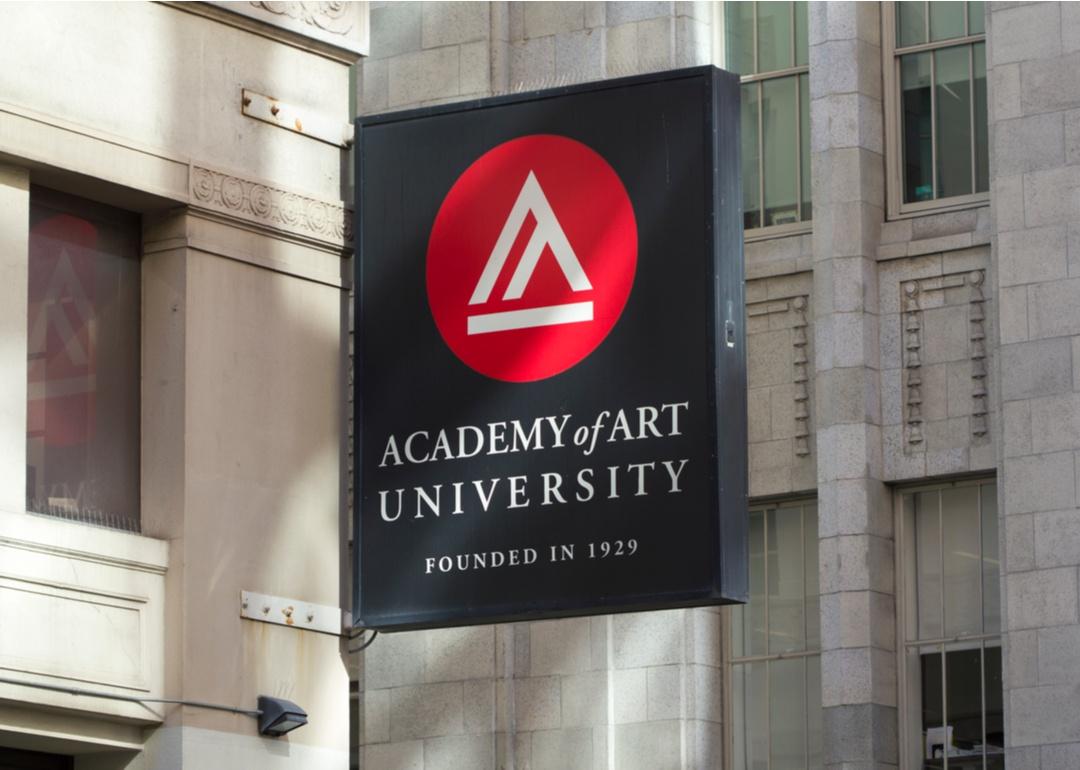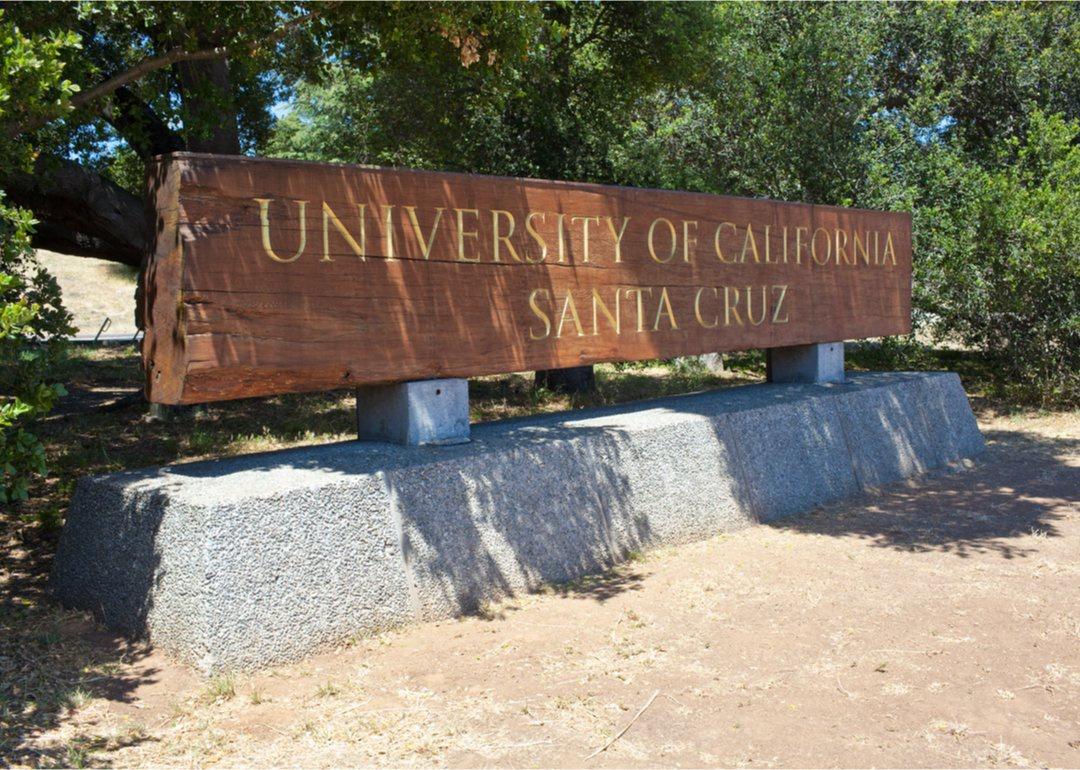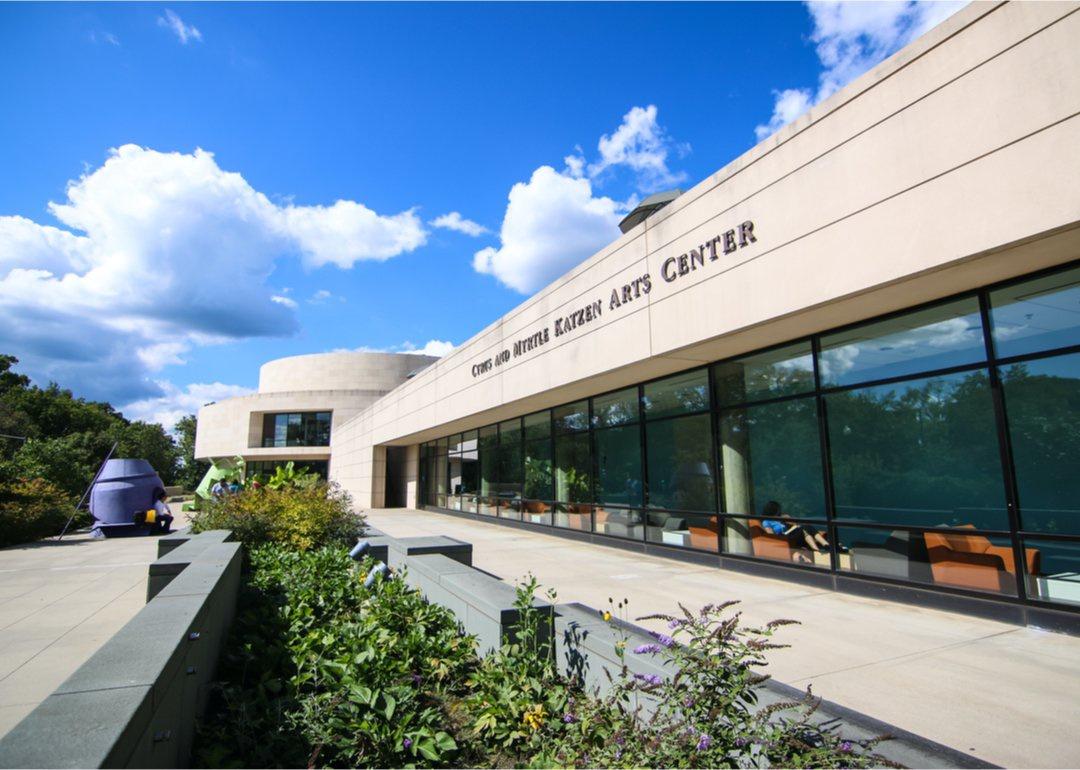Most liberal colleges in America
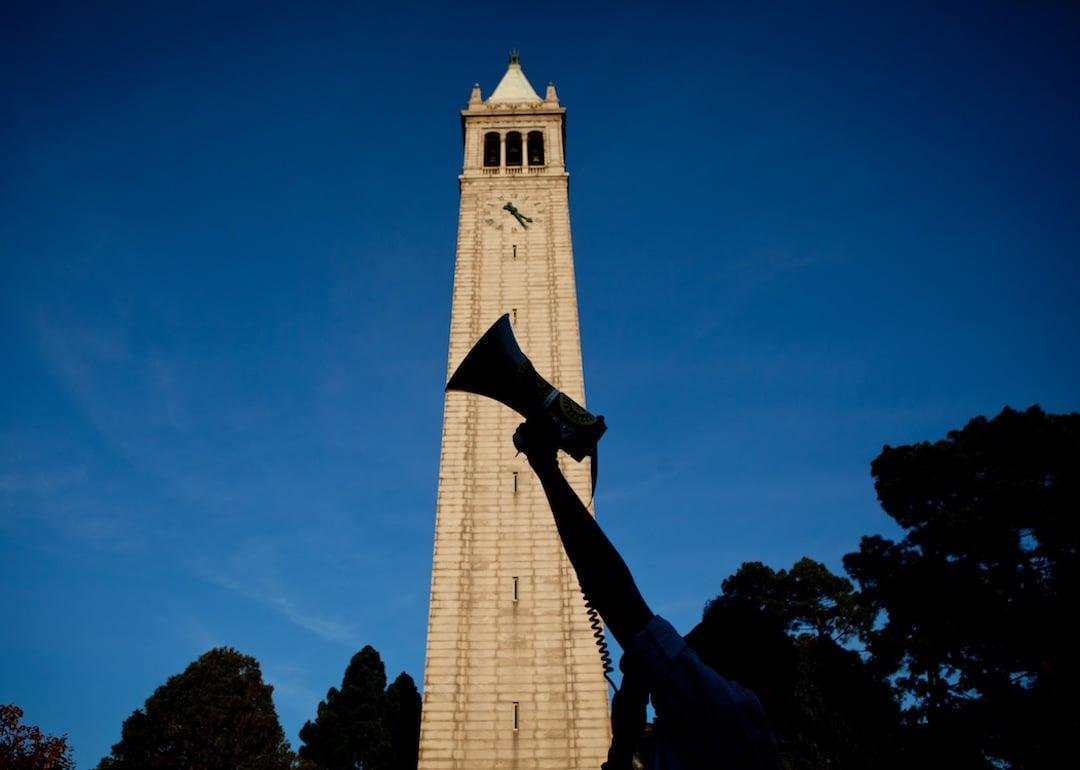
Max Whittaker // Getty Images
Most liberal colleges in America
While there is no indisputable proof that there are more liberals than conservatives in academia—and while it is likely that arguments against political bias have more to do with ideological challenges than oppression—the perception that higher education is overwhelmingly liberal is a persistent one.
It is true that some schools are more liberal than others. Just as there are intentionally conservative schools, there are likewise schools that have a history of liberalism or progressive ideology, schools that exist in more liberal regions of the country, and schools that are progressive by design. These schools tend to be among the most prestigious, largest, and best-endowed schools in the United States.
Stacker used data from Niche to determine the 50 most liberal universities and colleges in America. Niche’s methodology considered students’ self-reported political leanings while at the college they currently attend or recently attended, as well as the results of student surveys (data released and accurate as of January 2023) regarding campus political preferences, specifically liberal students’ opinions about the overall political leanings of students at their college.
Keep reading to find out which schools are the country’s most liberal.
You may also like: 45 best college movies
![]()
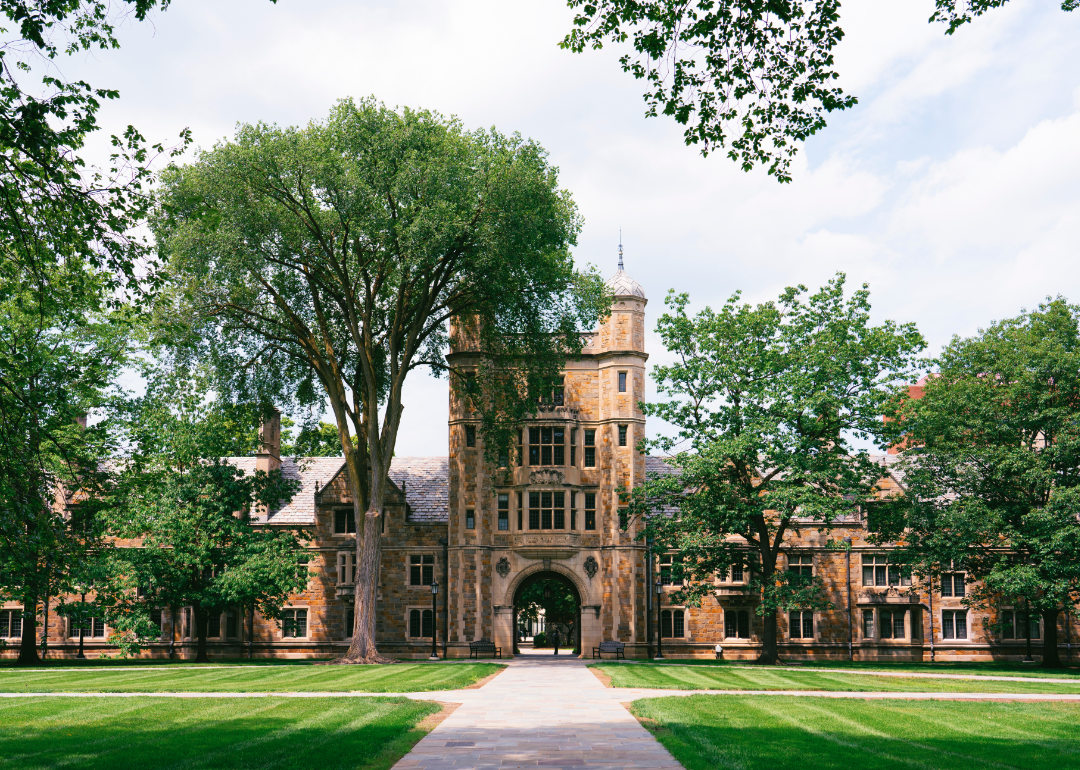
Canva
#50. University of Michigan – Ann Arbor
– Location: Ann Arbor, Michigan
– Students: 29,851 (student-to-faculty ratio: 4:1)
– Acceptance rate: 0.26 (ACT: 31-34; SAT: 1340-1520)
– Net price per year: $17,832
– Six-year median earnings: $63,400
The University of Michigan at Ann Arbor, founded in 1817, is the state’s oldest college with a history of embracing liberal ideals. In the 1960s, many Vietnam War protests took place on campus. In 1965, faculty and students joined forces to protest American policy in Southeast Asia, the first-ever teach-in led by school staff.
Lissandra Melo // Shutterstock
#49. University of San Francisco
– Location: San Francisco, California
– Students: 5,572 (student-to-faculty ratio: 8:1)
– Acceptance rate: 0.7 (ACT: 24-30; SAT: 1140-1330)
– Net price per year: $42,801
– Six-year median earnings: $62,300
In 2019, the University of San Francisco announced its achievement of carbon neutrality more than 30 years ahead of its 2050 target. This means the school offsets the carbon it uses, effectively casting a virtually invisible carbon footprint. The school did this by embracing green cleaning products, installing microturbines for heat and energy, and buying energy offsets, among other things.
Bryan Pollard // Shuttterstock
#48. University of North Carolina – Greensboro
– Location: Greensboro, North Carolina
– Students: 13,391 (student-to-faculty ratio: 15:1)
– Acceptance rate: 0.88 (ACT: 19-25; SAT: 980-1160)
– Net price per year: $9,853
– Six-year median earnings: $37,500
The University of North Carolina at Greensboro is a liberal arts university founded in 1891. It’s a public school located in the diverse city of Greensboro, which has a large percentage of Black residents where voters tend to be more liberal. UNC-Greensboro is a Division I athletics school.
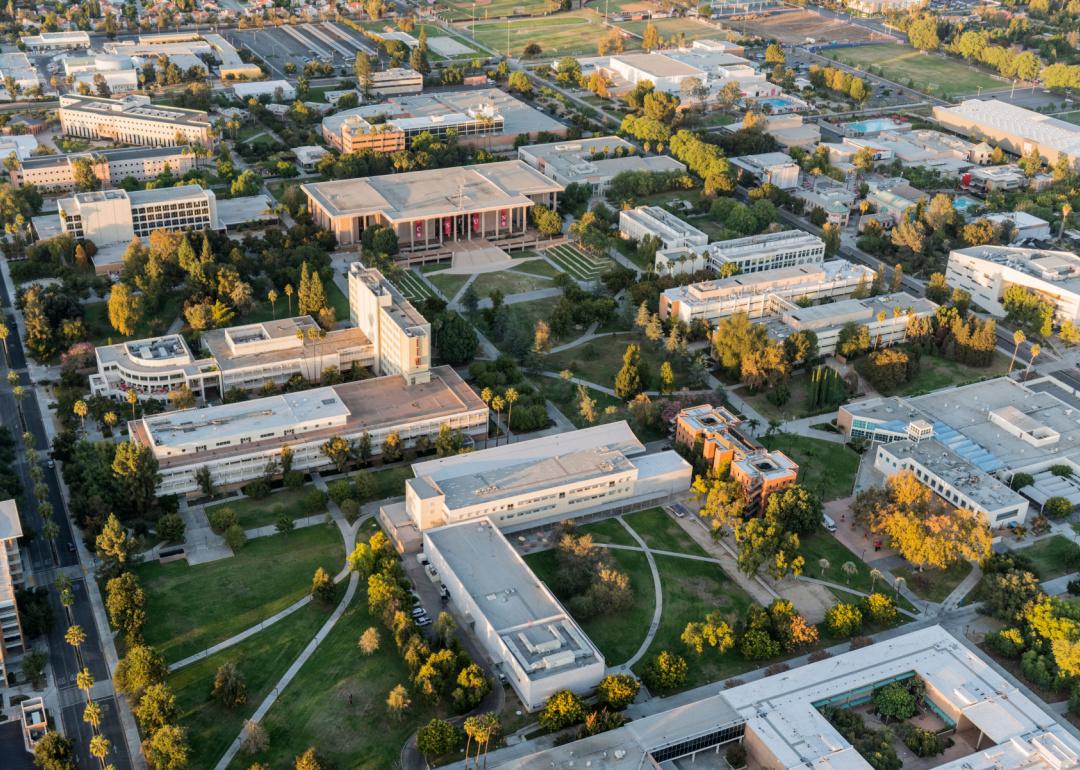
trekandshoot // Shutterstock
#47. California State University – Los Angeles
– Location: Los Angeles, California
– Students: 19,425 (student-to-faculty ratio: 21:1)
– Acceptance rate: 0.76 (ACT: 15-20; SAT: 870-1060)
– Net price per year: $3,859
– Six-year median earnings: $46,100
This public university is part of the California State University system and was established in 1947. Notable alumni include Billie Jean King, the famed tennis player who defeated Bobby Riggs during the “Battle of the Sexes” match. The internationally televised event and King herself are credited with gaining respect for women’s sports.
Ganna Tokolova // Shutterstock
#46. University of Southern California
– Location: Los Angeles, California
– Students: 18,560 (student-to-faculty ratio: 7:1)
– Acceptance rate: 0.16 (ACT: 30-34; SAT: 1340-1530)
– Net price per year: $39,759
– Six-year median earnings: $74,000
The University of Southern California is a private university—despite the state-school style of the name—and it’s also one of California’s oldest, founded in 1880. The school is highly selective, making it one of the West Coast’s most prestigious. There are nearly 50,000 students when you combine undergraduate and graduate students.
You may also like: 25 oldest colleges in America
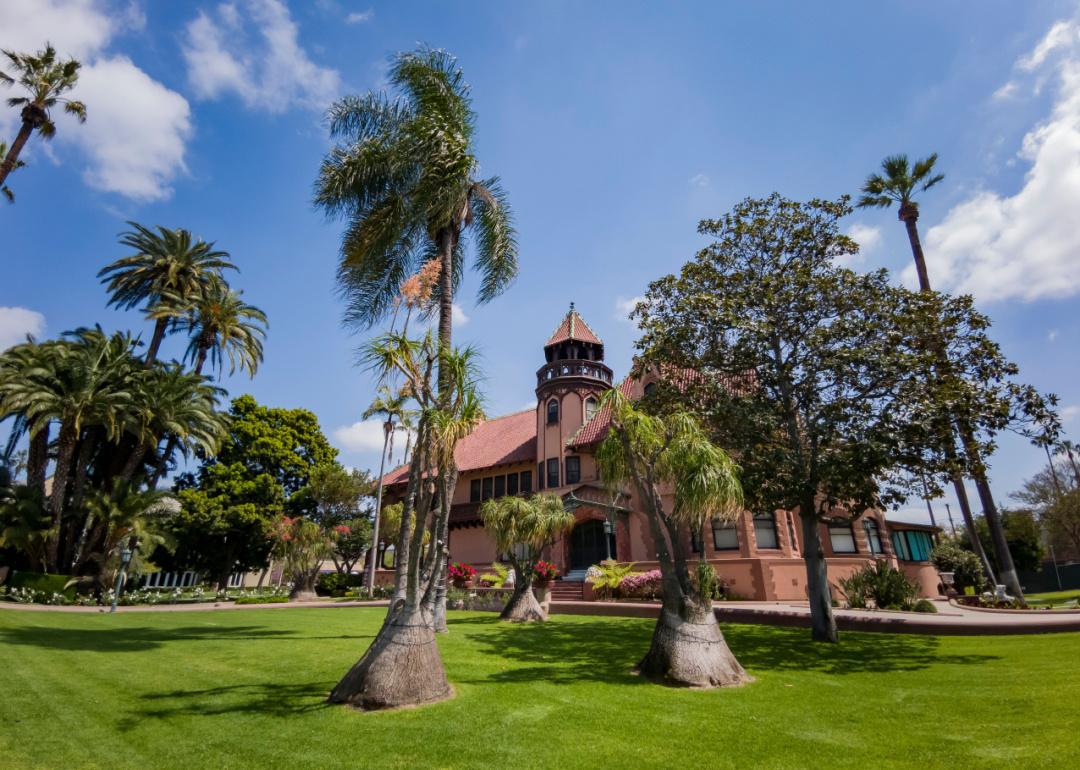
Kit Leong // Shutterstock
#45. Mount Saint Mary’s University – Los Angeles
– Location: Los Angeles, California
– Students: 1,462 (student-to-faculty ratio: 7:1)
– Acceptance rate: 0.89 (ACT: 18-23; SAT: 900-1110)
– Net price per year: $27,346
– Six-year median earnings: $53,200
Founded in 1925, Mount Saint Mary’s University in Los Angeles is a private, Catholic university with a student body that is 90% female. The school is home to the Geena Davis Institute on Gender in Media, a nonprofit research organization that works towards equal representation of all genders in media.
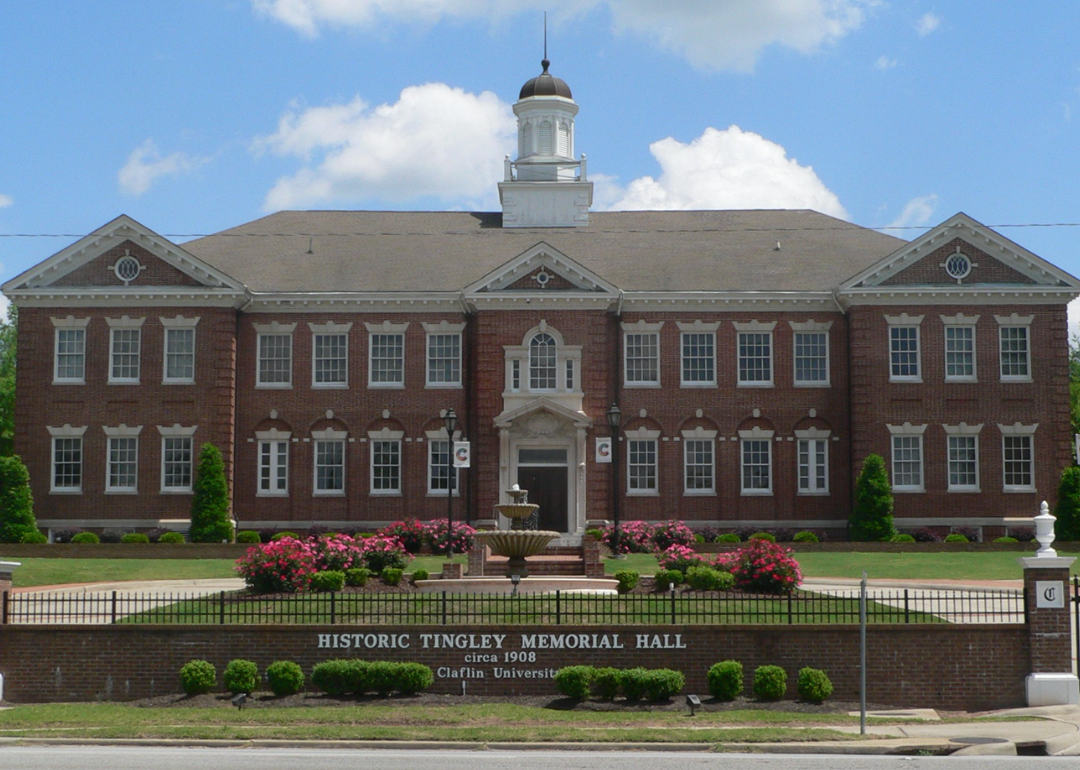
Ammodramus // Wikimedia Commons
#44. Claflin University
– Location: Orangeburg, South Carolina
– Students: 1,806 (student-to-faculty ratio: 13:1)
– Acceptance rate: 0.65 (ACT: 16-18; SAT: 840-1040)
– Net price per year: $20,806
– Six-year median earnings: $28,500
Claflin University is a historically Black university linked with the United Methodist Church. It was founded just after the American Civil War and is South Carolina’s oldest HBCU, with a series of notable Methodist bishops among its alumni.
Roman Tiraspolsky // Shutterstock
#43. CUNY John Jay College of Criminal Justice
– Location: New York, New York
– Students: 11,270 (student-to-faculty ratio: 19:1)
– Acceptance rate: 0.37 (ACT: 21-25; SAT: 1020-1160)
– Net price per year: $4,221
– Six-year median earnings: $44,900
A few liberal traditions overlap in CUNY John Jay College of Criminal Justice. It’s a public school located in the heart of the Big Apple, with a focus on criminal justice combined with the eclectic liberal arts. The school is spread over several buildings in midtown Manhattan. Fun fact: 85% of students graduate with zero student debt.
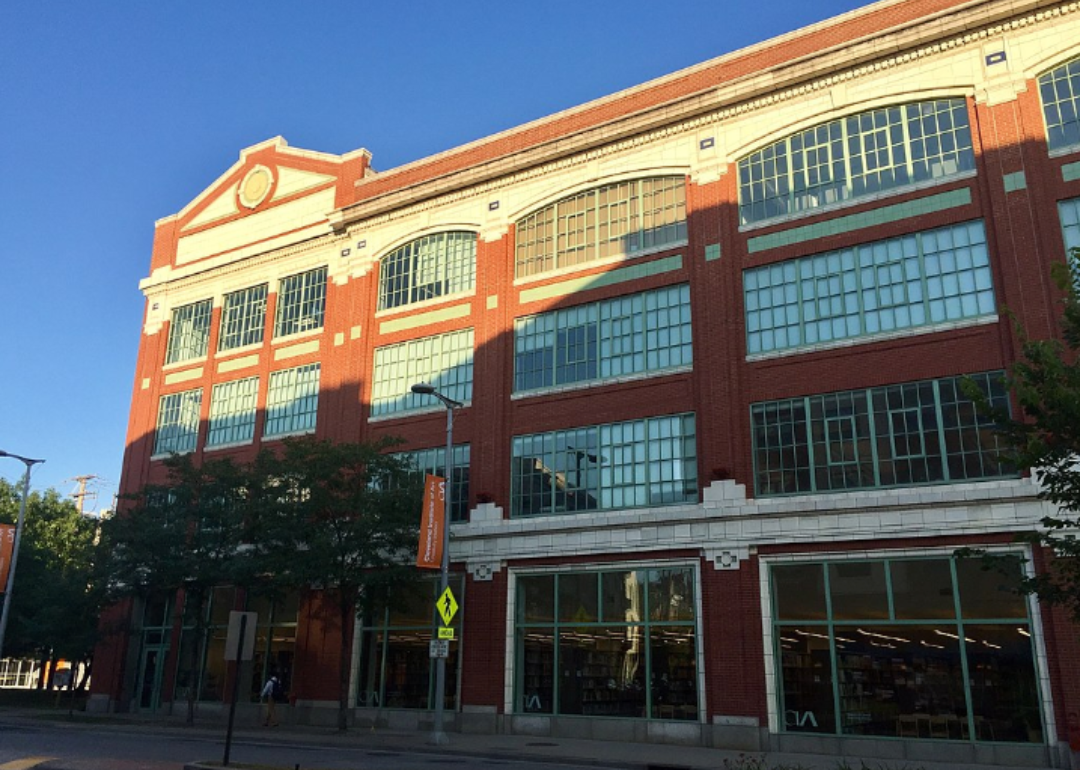
Warren Lemay // Wikimedia Commons
#42. Cleveland Institute of Art
– Location: Cleveland, Ohio
– Students: 590 (student-to-faculty ratio: 8:1)
– Acceptance rate: 0.67 (ACT: 19-27; SAT: 1070-1300)
– Net price per year: $35,344
– Six-year median earnings: $36,600
The Cleveland Institute of Art is an art and design institution established in 1882. It is home to Cleveland Cinematheque, a nationally renowned alternative film theater. The school is a bit on the smaller side, with just 50 staff members and 600 undergraduate students.
Bob Pool // Shutterstock
#41. Willamette University
– Location: Salem, Oregon
– Students: 1,201 (student-to-faculty ratio: 6:1)
– Acceptance rate: 0.8 (ACT: 25-30; SAT: 1100-1330)
– Net price per year: $37,913
– Six-year median earnings: $51,100
Willamette University is called a “college that changes lives,” with a higher graduation rate compared with peer institutions. The undergraduate programs are complemented by a law school attended by just a few hundred students.
You may also like: Best public colleges in America
David A Litman // Shutterstock
#40. University of California – Berkeley
– Location: Berkeley, California
– Students: 29,300 (student-to-faculty ratio: 14:1)
– Acceptance rate: 0.17 (ACT: 30-35; SAT: 1310-1530)
– Net price per year: $19,329
– Six-year median earnings: $64,700
The University of California at Berkeley has been the symbol of the progressive movement for at least the second half of the 20th century. The campus was instrumental in the Free Speech Movement of 1964, opposition to the Vietnam War, and the People’s Park protests of 1969—an event that led to the National Guard being called in against the student protesters.
Pbass1956 // Wikimedia Commons
#39. Denison University
– Location: Granville, Ohio
– Students: 2,258 (student-to-faculty ratio: 9:1)
– Acceptance rate: 0.28 (ACT: 28-32; SAT: 1220-1430)
– Net price per year: $39,808
– Six-year median earnings: $48,800
This independent school is among the top in the nation for producing Fulbright students. Denison is a test-optional college that offers 65 academic programs and a low student-faculty ratio.
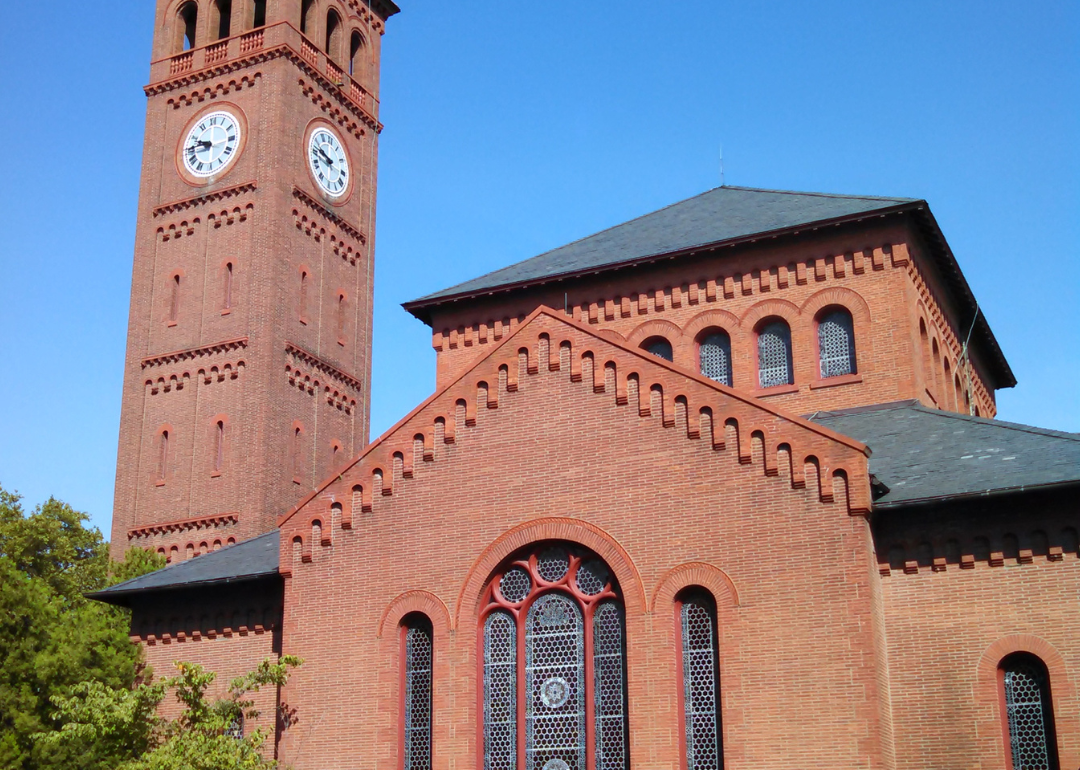
James Kirkikis // Shutterstock
#38. Hampton University
– Location: Hampton, Virginia
– Students: 2,814 (student-to-faculty ratio: 13:1)
– Acceptance rate: 0.36 (ACT: 20-24; SAT: 980-1120)
– Net price per year: $28,952
– Six-year median earnings: $44,700
Hampton University is a private, historically Black university founded in 1868. It was initially designated as a school exclusively for formerly enslaved persons. Since then, the university has produced countless notable alumni including Wanda Sykes and Booker T. Washington.
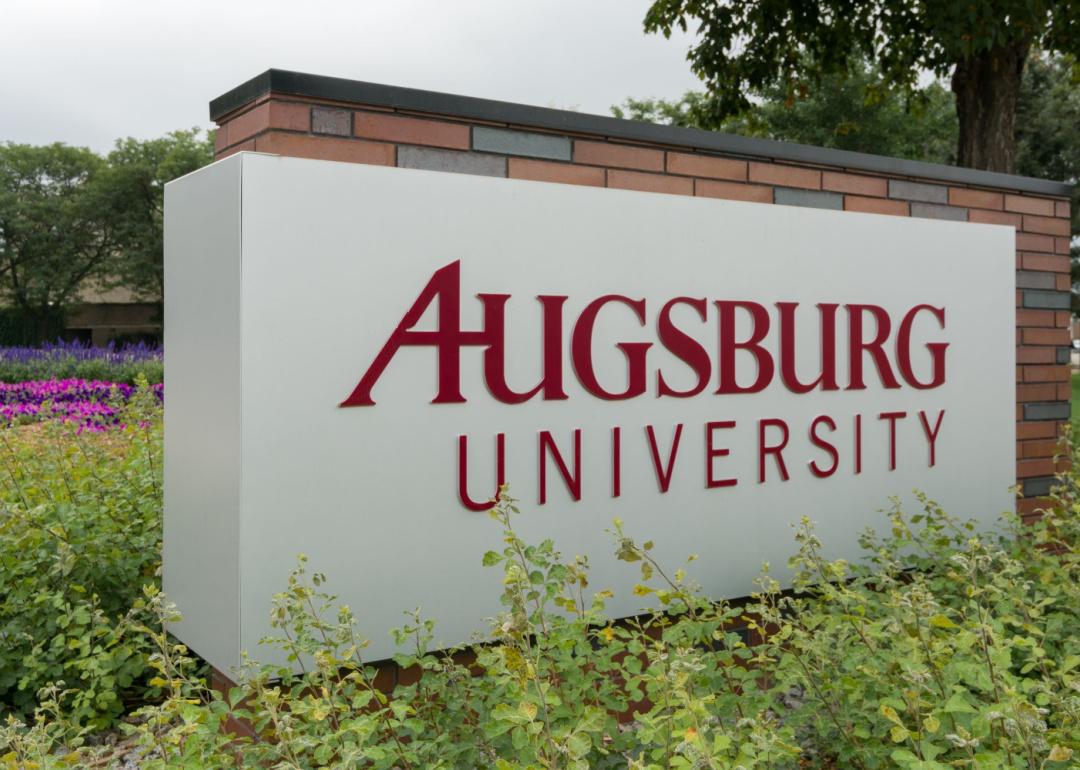
Ken Wolter // Shutterstock
#37. Augsburg University
– Location: Minneapolis, Minnesota
– Students: 2,202 (student-to-faculty ratio: 10:1)
– Acceptance rate: 0.73 (ACT: 18-23; SAT: 1060-1300)
– Net price per year: $24,306
– Six-year median earnings: $46,800
Augsburg University was established in 1869 as a Norwegian-American Lutheran seminary. The school shifted its focus towards its academic sector over its theological roots circa 1911. Now, the school embraces a service-learning style and requires its students to participate in volunteer work as part of its curriculum.
Steve Cwik // Shutterstock
#36. Binghamton University, SUNY
– Location: Vestal, New York
– Students: 13,889 (student-to-faculty ratio: 17:1)
– Acceptance rate: 0.43 (ACT: 29-32; SAT: 1290-1450)
– Net price per year: $19,061
– Six-year median earnings: $61,600
Binghamton University is part of the State University of New York system, with campuses scattered across the central New York area. Influential comics artist Art Spiegelman attended the university before dropping out. The school houses S3IP, a prototyping research center.
You may also like: Best colleges in America
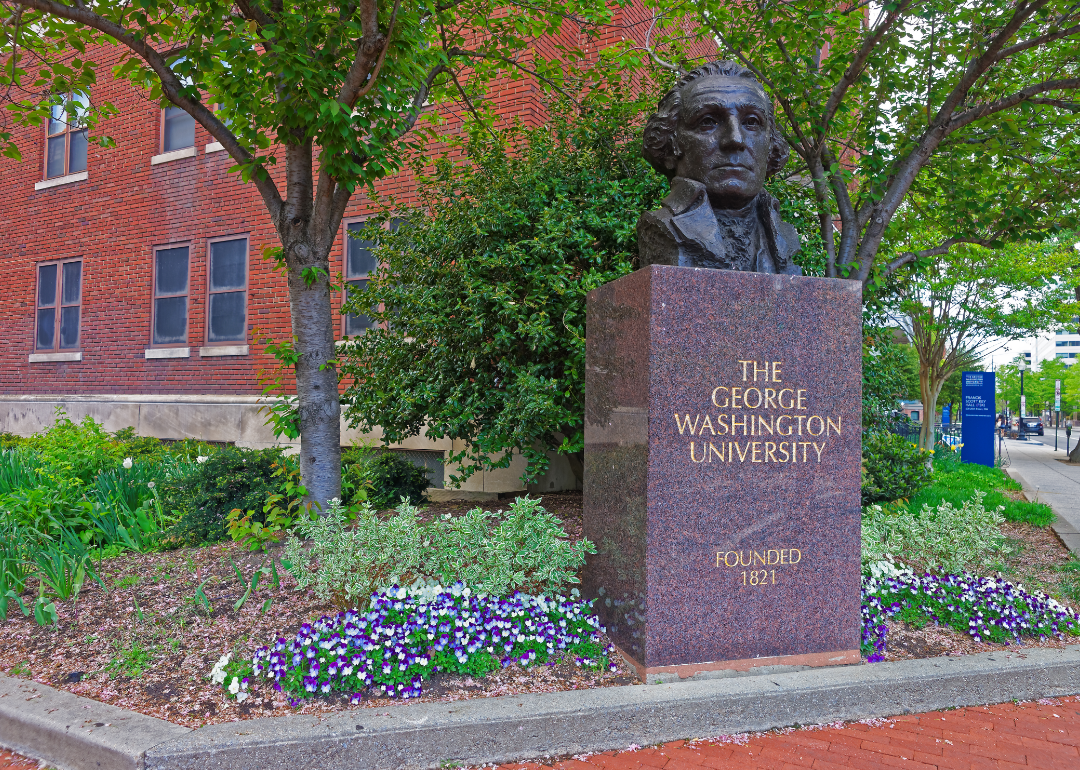
Canva
#35. George Washington University
– Location: Washington D.C.
– Students: 10,141 (student-to-faculty ratio: 6:1)
– Acceptance rate: 0.43 (ACT: 30-33; SAT: 1270-1450)
– Net price per year: $40,308
– Six-year median earnings: $69,600
Located in the heart of Washington D.C., George Washington University is a private university established in 1821. The school boasts an impressive number of notable alumni. Its Nanofabrication and Imaging Center is a state-of-the-art research facility that aids cross-disciplinary work in engineering, chemistry, physics, biology, public health, medicine, and biomedical sciences.
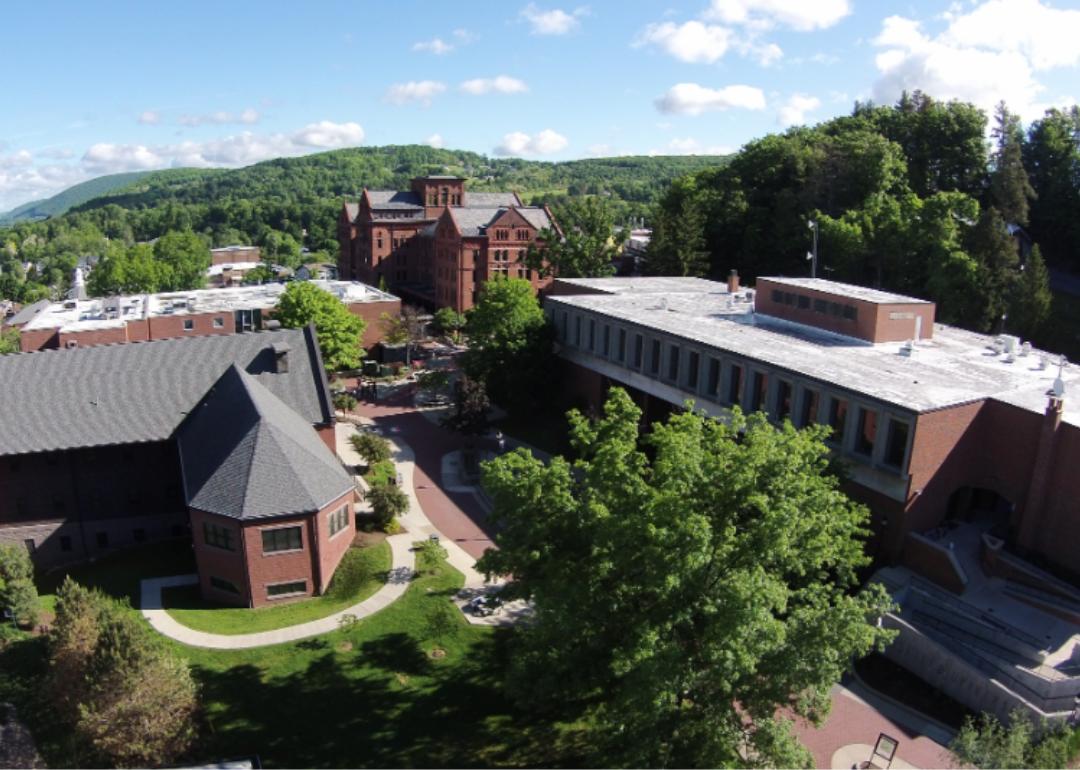
Johnmaslar // Wikimedia Commons
#34. Mansfield University of Pennsylvania
– Location: Mansfield, Pennsylvania
– Students: 1,386 (student-to-faculty ratio: 13:1)
– Acceptance rate: 0.96 (ACT: 16-22; SAT: 960-1130)
– Net price per year: $12,010
– Six-year median earnings: $38,600
Mansfield University of Pennsylvania is a campus of the Commonwealth University of Pennsylvania with roots dating back to 1857 as the Mansfield Classical Seminary. The school has a unique claim to fame: In 1892, its students played football against Wyoming Seminary in what would become the first-ever American football game played at night. The event is celebrated annually with a reenactment in the town.
Feng Cheng // Shutterstock
#33. Mount Holyoke College
– Location: South Hadley, Massachusetts
– Students: 2,200 (student-to-faculty ratio: 10:1)
– Acceptance rate: 0.52 (ACT: 27-30; SAT: 1270-1500)
– Net price per year: $31,165
– Six-year median earnings: $48,600
Mount Holyoke College is a private women’s college that is the oldest of the Seven Sisters, a group of women’s institutions based in the northeastern U.S. Among its most notable alumni is poet Emily Dickinson.
Monkey Business Images // Shutterstock
#32. Fayetteville State University
– Location: Fayetteville, North Carolina
– Students: 3,959 (student-to-faculty ratio: 15:1)
– Acceptance rate: 0.79 (ACT: 16-20; SAT: 840-1000)
– Net price per year: $7,016
– Six-year median earnings: $31,200
Fayetteville is often cited as a liberal bastion within otherwise conservative North Carolina, and Fayetteville State University extends that reputation into education. The university’s undergraduate programs serve students of all ability levels, including those of traditional college age as well as returning adults.
Eric Glenn // Shutterstock
#31. Howard University
– Location: Washington D.C.
– Students: 7,497 (student-to-faculty ratio: 8:1)
– Acceptance rate: 0.39 (ACT: 22-26; SAT: 1130-1260)
– Net price per year: $23,233
– Six-year median earnings: $49,200
An HBCU in the nation’s capital, Howard University is a top-tier research university that was chosen by the Department of Defense to lead its new research center in early 2023. It is also one of the most selective schools for Black students and a top 25 law school for placing graduates in successful law firms.
You may also like: College majors that earn the most money
Jeffrey M. Frank // Shutterstock
#30. Tuskegee University
– Location: Tuskegee, Alabama
– Students: 2,170 (student-to-faculty ratio: 9:1)
– Acceptance rate: 0.61 (ACT: 18-24; SAT: 860-1080)
– Net price per year: $36,528
– Six-year median earnings: $35,500
Tuskegee is a historically Black university that was the longtime home to professor George Washington Carver. It was also the home base of the Tuskegee Airmen, an elite group of Black pilots who trained a few miles from the main campus.
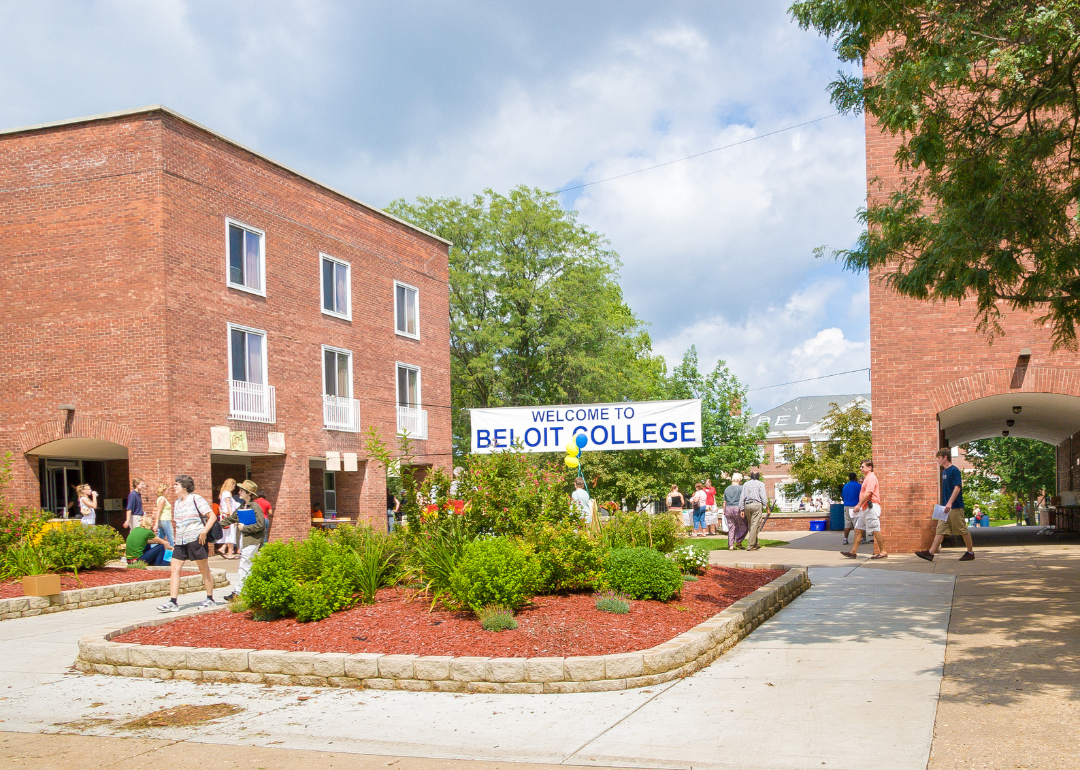
Philip Arno Photography // Shutterstock
#29. Beloit College
– Location: Beloit, Wisconsin
– Students: 978 (student-to-faculty ratio: 11:1)
– Acceptance rate: 0.58 (ACT: 24-30; SAT: 1080-1380)
– Net price per year: $24,419
– Six-year median earnings: $42,400
Founded in 1846, Beloit College is the oldest college in Wisconsin. The school offers unique housing options to its students that center around special interests ranging from foreign languages to feminism.
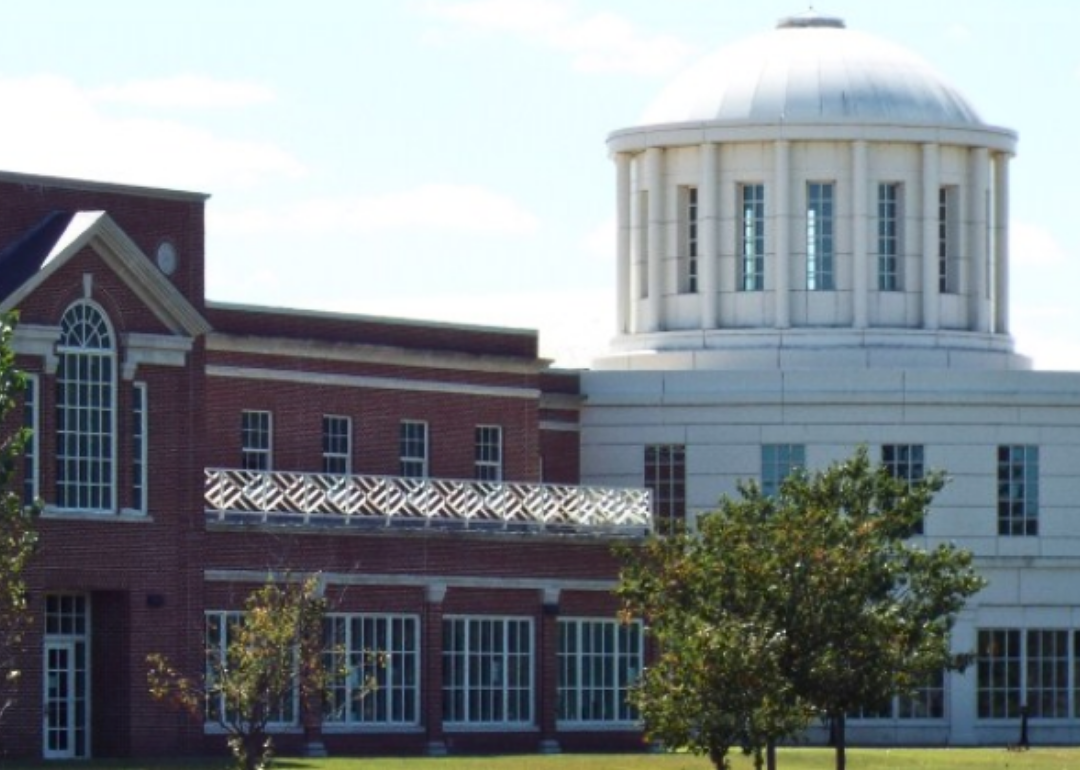
Honors Lane // Wikimedia Commons
#28. University of Maryland Eastern Shore
– Location: Princess Anne, Maryland
– Students: 1,860 (student-to-faculty ratio: 8:1)
– Acceptance rate: 0.62 (ACT: 16-19; SAT: 840-1010)
– Net price per year: $15,633
– Six-year median earnings: $36,600
The University of Maryland Eastern Shore is a public historically Black college founded in 1886. In 1948, its students played against Albright College in one of the first football games between a historically Black school and a majority-white school. The University is a member school of the Thurgood Marshall College Fund, a nonprofit organization that supports historically Black colleges.
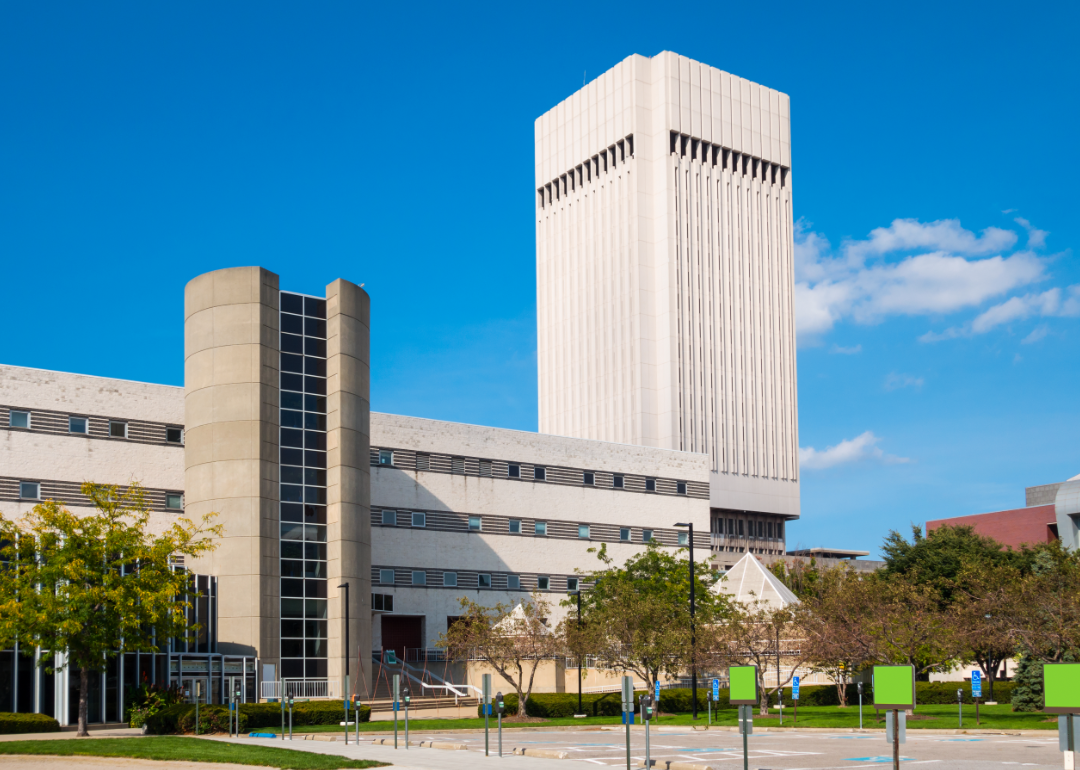
Canva
#27. Cleveland State University
– Location: Cleveland, Ohio
– Students: 8,803 (student-to-faculty ratio: 13:1)
– Acceptance rate: 0.94 (ACT: 19-25; SAT: 980-1210)
– Net price per year: $16,007
– Six-year median earnings: $41,300
Cleveland State University is a public school founded in 1964. The school emphasizes “engaged learning,” in which students participate in internships and other similar experiential opportunities during their coursework.
ARTYOORAN // Shutterstock
#26. Portland State University
– Location: Portland, Oregon
– Students: 12,752 (student-to-faculty ratio: 15:1)
– Acceptance rate: 0.95 (ACT: 17-24; SAT: 1000-1190)
– Net price per year: $12,195
– Six-year median earnings: $44,700
Portland State University was created as a postsecondary educational option for returning World War II veterans. It is the only public university in Oregon near a city center. The university has developed partnerships with companies such as Intel and Portland General Electric, among others.
You may also like: States spending the most and least per student on education
Wangkun Jia // Shutterstock
#25. Northeastern University
– Location: Boston, Massachusetts
– Students: 15,131 (student-to-faculty ratio: 10:1)
– Acceptance rate: 0.2 (ACT: 33-35; SAT: 1410-1540)
– Net price per year: $37,738
– Six-year median earnings: $67,400
Boston has more than its share of first-class universities. Northeastern University is Boston’s research university, relying on a cooperative educational model—which pairs classroom work with professional experiences such as internships—to offer a complete educational experience. It is one of the leading schools in the world for co-op education and internships.
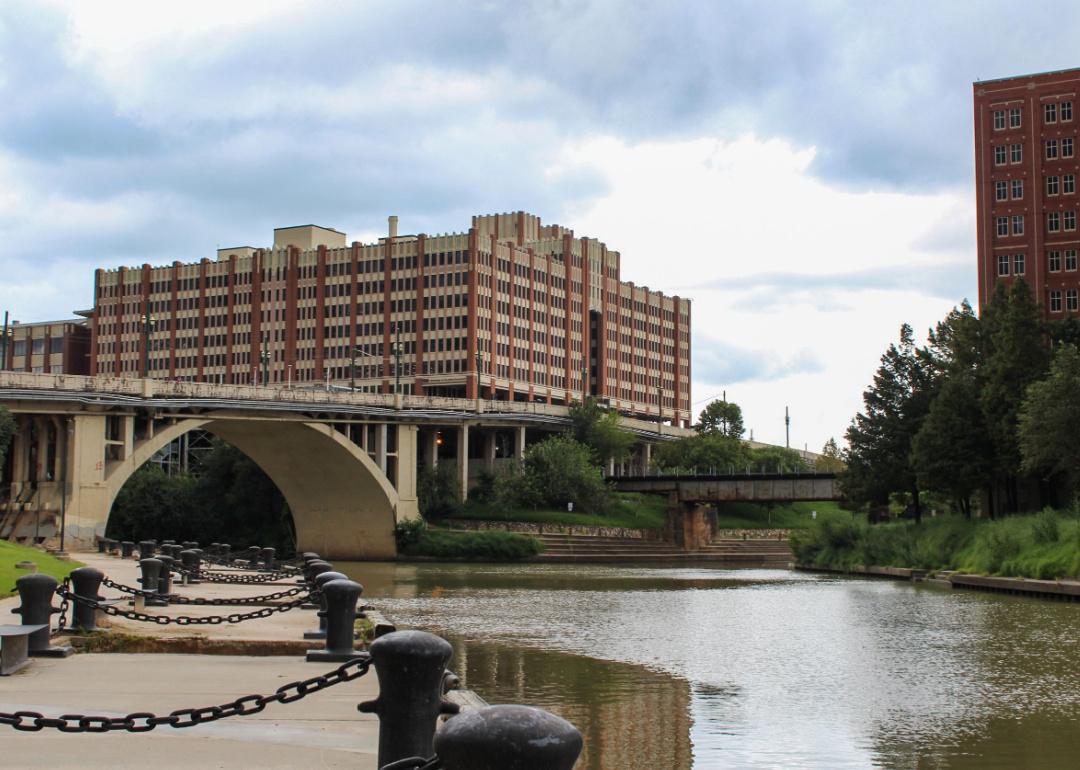
Andrew Vaughan // Shutterstock
#24. University of Houston – Downtown
– Location: Houston, Texas
– Students: 6,865 (student-to-faculty ratio: 19:1)
– Acceptance rate: 0.93 (ACT: 16-20; SAT: 920-1080)
– Net price per year: $12,087
– Six-year median earnings: $45,000
The University of Houston was founded in 1974 and is the second-largest university in Houston. In January 2023, the school opened a Wellness & Success Center that aims to uplift students by providing information and resources in support of health and fitness. The school is a designated Hispanic-Serving Institution.
Ajay Suresh // Wikimedia Commons
#23. CUNY New York City College of Technology
– Location: Brooklyn, New York
– Students: 9,846 (student-to-faculty ratio: 17:1)
– Acceptance rate: 0.79 (ACT: No data available; SAT: 843-1030)
– Net price per year: $5,097
– Six-year median earnings: $40,600
In the heart of Brooklyn, CUNY New York City College of Technology offers both traditional and returning college students a practical and convenient educational option. The college was founded in 1946 as a path to meaningful careers for returning World War II soldiers.
Andriy Blokhin // Shutterstock
#22. Pace University
– Location: New York, New York
– Students: 7,336 (student-to-faculty ratio: 10:1)
– Acceptance rate: 0.83 (ACT: 22-28; SAT: 1060-1240)
– Net price per year: $32,886
– Six-year median earnings: $60,300
Pace University is the umbrella name for a collection of schools based in New York City and upstate, covering everything from undergraduate liberal arts to the MFA drama program home to “Inside the Actors Studio.” Alumni include “Sopranos” star Vincent Pastore and celebrity chef Rachael Ray.
EQRoy // Shutterstock
#21. CUNY Hunter College
– Location: New York, New York
– Students: 13,753 (student-to-faculty ratio: 15:1)
– Acceptance rate: 0.4 (ACT: 25-31; SAT: 1170-1340)
– Net price per year: $4,014
– Six-year median earnings: $47,200
Hunter College in New York City has distinguished itself as a center of excellence by being a top Fulbright institution. The school also boasts alums Vin Diesel, Hugh Downs, Rhea Perlman, Donna Shalala, and Judy Reyes.
You may also like: Can you pass this 8th grade assessment test?
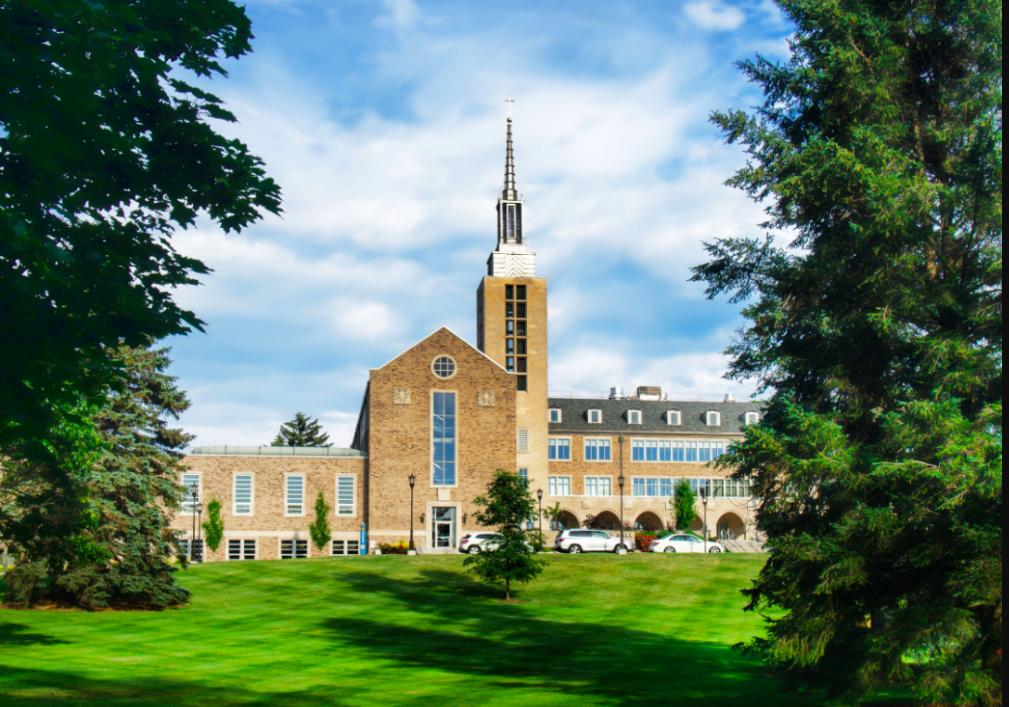
debra millet // Shutterstock
#20. St. John Fisher University
– Location: Rochester, New York
– Students: 2,573 (student-to-faculty ratio: 9:1)
– Acceptance rate: 0.68 (ACT: 22-27; SAT: 1060-1240)
– Net price per year: $29,722
– Six-year median earnings: $47,800
St. John Fisher University was established in 1948. Though originally conceived as a men’s college, the school began admitting women in 1971. The school emphasizes public service and hosts an annual dance marathon for charity.
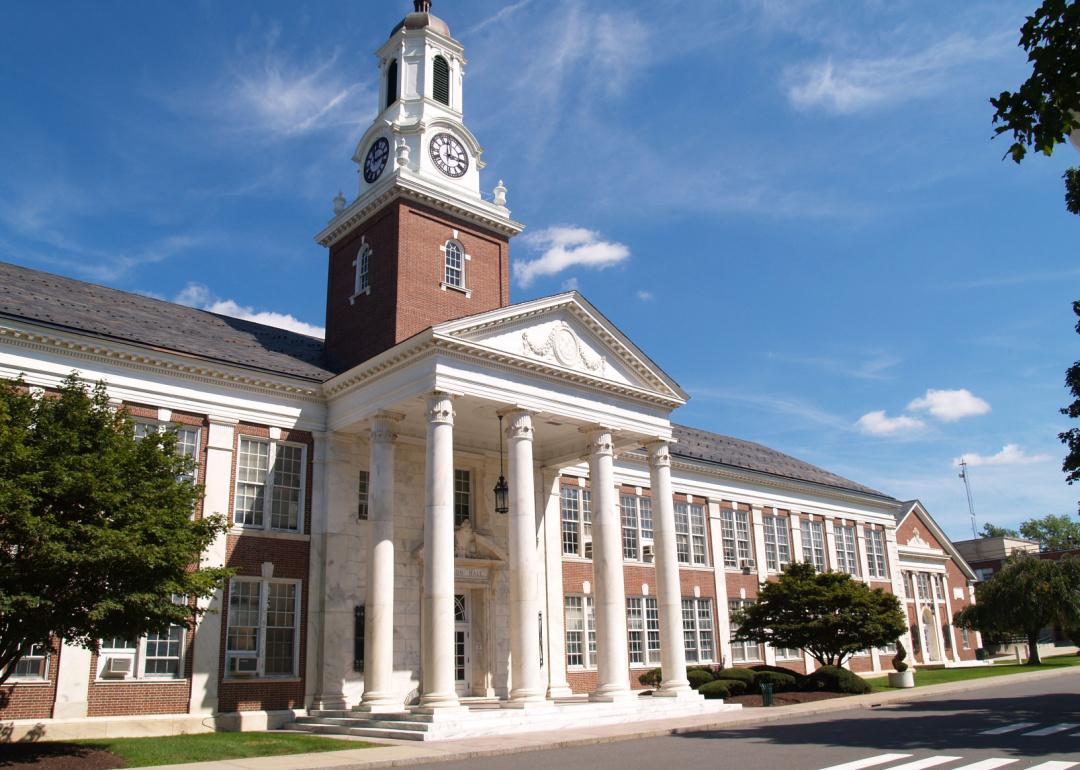
Cynthia Farmer // Shutterstock
#19. Central Connecticut State University
– Location: New Britain, Connecticut
– Students: 6,811 (student-to-faculty ratio: 13:1)
– Acceptance rate: 0.65 (ACT: 19-25; SAT: 970-1150)
– Net price per year: $16,017
– Six-year median earnings: $47,900
Founded in 1849, Central Connecticut State University is both the largest and oldest university in Connecticut. The school is designated as a Community Engagement University by the Carnegie Foundation, denoting the school’s commitment to serving the local community through service and volunteering.
Daniellek0512 // Shutterstock
#18. Ramapo College of New Jersey
– Location: Mahwah, New Jersey
– Students: 4,720 (student-to-faculty ratio: 17:1)
– Acceptance rate: 0.67 (ACT: 21-27; SAT: 1040-1220)
– Net price per year: $17,286
– Six-year median earnings: $53,200
Ramapo College is only about 50 years old, making it one of the youngest schools on the list. It sprang up in response to the development in the surrounding suburban area. As a small (but public) liberal arts college, it appeals to a different demographic than local community colleges or larger public universities.
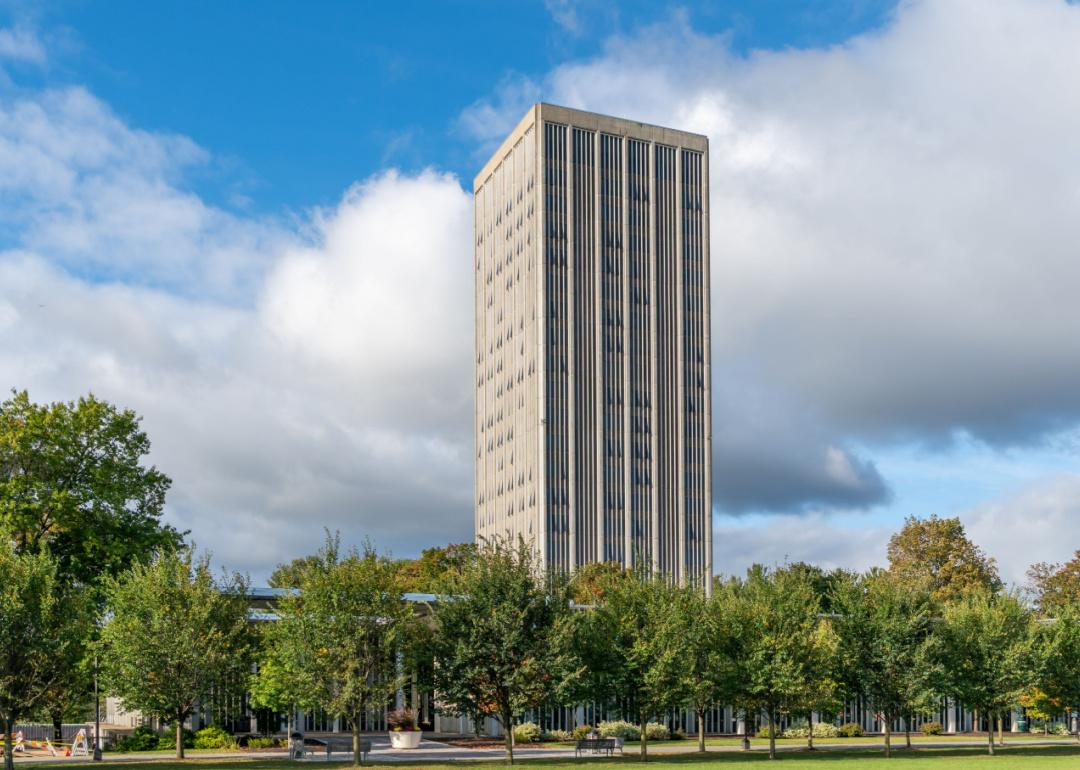
Ken Wolter // Shutterstock
#17. University at Albany, SUNY
– Location: Albany, New York
– Students: 12,203 (student-to-faculty ratio: 16:1)
– Acceptance rate: 0.57 (ACT: 22-28; SAT: 1090-1250)
– Net price per year: $17,486
– Six-year median earnings: $51,500
The State University of New York at Albany, founded in 1844, is one of four campuses of the SUNY system. The school emphasizes study-abroad programs and is also renowned for its arts and culture environment, which includes an art museum.
Paul Brady Photography // Shutterstock
#16. Northwestern University
– Location: Evanston, Illinois
– Students: 8,095 (student-to-faculty ratio: 3:1)
– Acceptance rate: 0.09 (ACT: 33-35; SAT: 1430-1550)
– Net price per year: $28,344
– Six-year median earnings: $69,000
Illinois’ marquee research university, Northwestern University drew in more than $360 million in sponsored research in FY 2023. The university is a founding member of the Big Ten Conference and the only private university currently part of the conference. It also has one of the largest endowments of any university in the United States, valued at more than $14 billion.
You may also like: Best private high school in every state
Jennifer Williams // Wikimedia Commons
#15. California State University – East Bay
– Location: Hayward, California
– Students: 10,473 (student-to-faculty ratio: 21:1)
– Acceptance rate: 0.73 (ACT: 16-21; SAT: 800-1020)
– Net price per year: $13,260
– Six-year median earnings: $51,700
Cal State East Bay is found in the diverse community of Hayward, which experienced a heyday of industrial food production decades ago. Its student population was named one of the most diverse in America by the Chronicle of Higher Education.
Canva
#14. West Chester University of Pennsylvania
– Location: West Chester, Pennsylvania
– Students: 13,056 (student-to-faculty ratio: 18:1)
– Acceptance rate: 0.86 (ACT: 20-26; SAT: 1010-1180)
– Net price per year: $19,336
– Six-year median earnings: $48,400
Jill Biden earned her master’s degree at West Chester University, a public research university just west of Philadelphia. It belongs to a consortium of public Pennsylvania universities that stretches all the way to Edinboro University of Pennsylvania in the other corner of the state.
ESB Professional // Shutterstock
#13. Adelphi University
– Location: Garden City, New York
– Students: 4,939 (student-to-faculty ratio: 9:1)
– Acceptance rate: 0.75 (ACT: 21-27; SAT: 1060-1250)
– Net price per year: $29,821
– Six-year median earnings: $58,500
Adelphi University is based in Long Island’s Garden City but has campuses in other New York locations. Public Enemy’s Chuck D and Flavor Flav met as students there in the 1980s.

Steve Cukrov // Shutterstock
#12. Stony Brook University, SUNY
– Location: Stony Brook, New York
– Students: 16,586 (student-to-faculty ratio: 8:1)
– Acceptance rate: 0.49 (ACT: 26-32; SAT: 1230-1440)
– Net price per year: $16,478
– Six-year median earnings: $57,600
New York’s Stony Brook University has a prestigious graduate school system that produces tons of cutting-edge research, like recent findings about brain conditions among 9/11 first responders. The Long Island institution is part of New York’s robust State University of New York system.
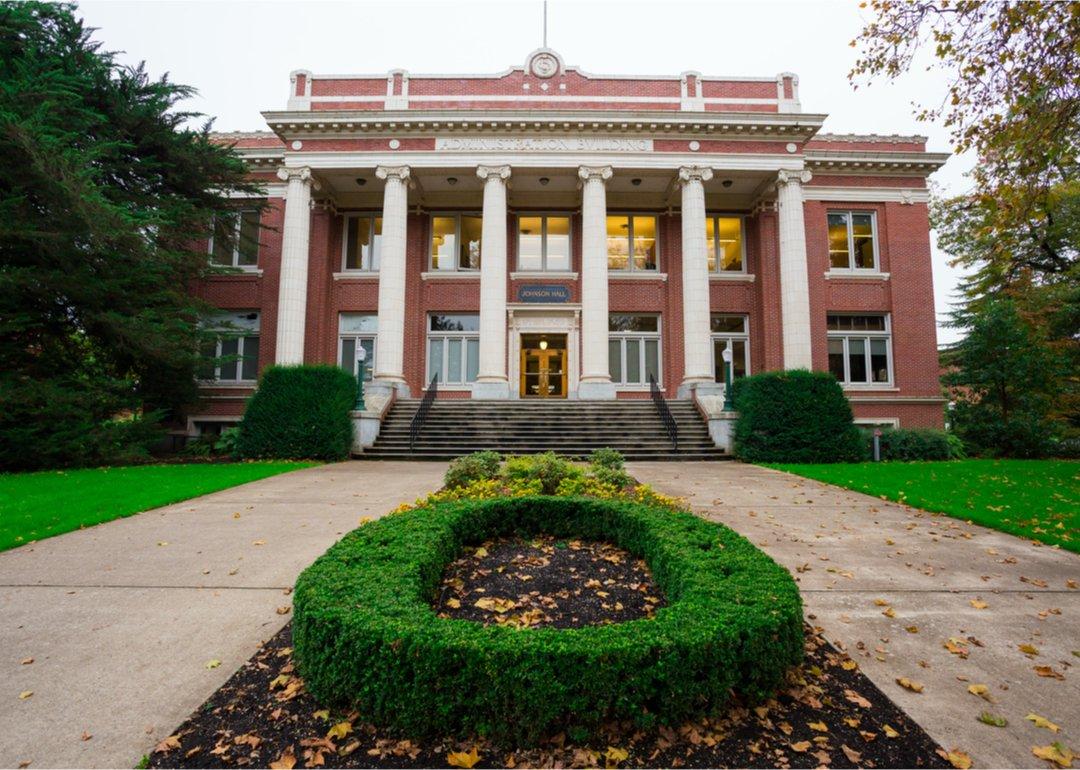
Joshua Rainey Photography // Shutterstock
#11. University of Oregon
– Location: Eugene, Oregon
– Students: 16,400 (student-to-faculty ratio: 16:1)
– Acceptance rate: 0.84 (ACT: 22-29; SAT: 1090-1290)
– Net price per year: $17,646
– Six-year median earnings: $44,800
Another hipster-friendly environment, Eugene plays host to the University of Oregon. The university’s Phil and Penny Knight Campus for Accelerating Scientific Impact was funded in part by the single-largest gift ever given to a public university.
You may also like: 2-year degrees that go on to earn the least money
littlenySTOCK // Shutterstock
#10. New York University
– Location: New York, New York
– Students: 25,854 (student-to-faculty ratio: 4:1)
– Acceptance rate: 0.21 (ACT: 31-34; SAT: 1370-1540)
– Net price per year: $45,417
– Six-year median earnings: $61,900
Greenwich Village’s New York University is the spiritual competitor to Columbia University. In 2019, researchers from the university discovered that humans evolved from ground-dwelling apes rather than primates that lived in trees.
Kit Leong // Shutterstock
#9. University of California – Riverside
– Location: Riverside, California
– Students: 22,056 (student-to-faculty ratio: 20:1)
– Acceptance rate: 0.66 (ACT: 22-31; SAT: 1080-1280)
– Net price per year: $11,948
– Six-year median earnings: $49,700
In 2023, the University of California-Riverside announced that the school received a $4.5 million grant from NASA to partner with the Jet Propulsion Laboratory’s Fellowships and Internships in Extremely Large Data Sets, or FIELDS, project to train underrepresented students in various research disciplines.
f11 photo // Shutterstock
#8. University of Washington
– Location: Seattle, Washington
– Students: 29,350 (student-to-faculty ratio: 6:1)
– Acceptance rate: 0.56 (ACT: 27-33; SAT: 1200-1470)
– Net price per year: $9,661
– Six-year median earnings: $57,700
A graduate student team from the University of Washington won a 2019 competition for environmental innovation. The team discovered a way to make batteries degrade more slowly over time, allowing them to stay useful longer. “If you can fix batteries, it has an impact on so many other clean energy technologies,” Elizabeth Rasmussen, founder of MOtiF Materials, the University of Washington team, told GeekWire.
eskystudio // Shutterstock
#7. Boston University
– Location: Boston, Massachusetts
– Students: 16,026 (student-to-faculty ratio: 5:1)
– Acceptance rate: 0.2 (ACT: 30-34; SAT: 1310-1500)
– Net price per year: $29,154
– Six-year median earnings: $65,300
The largest school in New England, Boston University is emblematic of Beantown. Many of its buildings are recognizable landmarks. The alma mater of the Rev. Dr. Martin Luther King Jr.—where he received his Ph.D. in systematic theology in 1955—also boasts an alumni roster that includes Alexander Graham Bell, Elie Wiesel, Isaac Asimov, Saul Bellow, President William Howard Taft, Julianne Moore, Marisa Tomei, and Howard Stern.
James Kirkikis // Shutterstock
#6. San Jose State University
– Location: San Jose, California
– Students: 23,317 (student-to-faculty ratio: 20:1)
– Acceptance rate: 0.67 (ACT: 19-26; SAT: 1010-1240)
– Net price per year: $15,995
– Six-year median earnings: $56,100
In 2019, San Jose State University opened a food pantry for its neediest students. Any enrolled student with an annual income of less than $33,000 may use the pantry once a week to ensure they have access to the nutrition they need. The pantry has become a beacon of campus life in the intervening years and works in conjunction with the CalFresh program of food assistance.
You may also like: 30 celebs you didn’t know were Ivy Leaguers
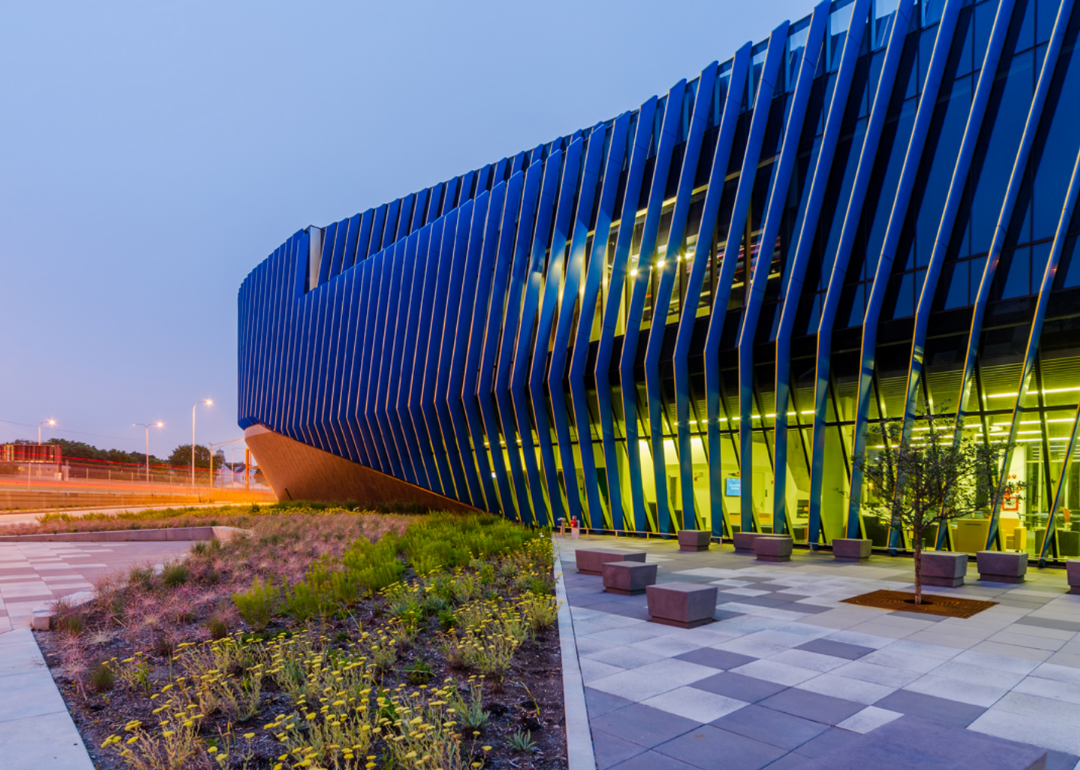
Serhii // Wikimedia Commons
#5. Northeastern Illinois University
– Location: Chicago, Illinois
– Students: 3,019 (student-to-faculty ratio: 11:1)
– Acceptance rate: 0.61 (ACT: 15-21; SAT: 810-1010)
– Net price per year: $14,831
– Six-year median earnings: $37,900
Deeply diverse Northeastern Illinois University is a Hispanic-Serving Institution and one of the most upwardly mobile universities in the country. The undergraduate programs include older working adults as well as those of traditional college age, mixing liberal arts with pre-professional studies and certificate programs.
Bob LoCicero // Shutterstock
#4. University of Vermont
– Location: Burlington, Vermont
– Students: 10,235 (student-to-faculty ratio: 10:1)
– Acceptance rate: 0.71 (ACT: 26-31; SAT: 1160-1350)
– Net price per year: $20,235
– Six-year median earnings: $47,300
Vermont has garnered a reputation for being hippie- and hipster-friendly. One of the “Public Ivy” schools, the University of Vermont has been progressive in recent years, with the inclusion of gender-neutral, single-occupancy bathrooms throughout campus, extensive environmental sustainability initiatives, and its FeelGood chapter, which raised more than $100,000 toward ending extreme hunger.
Tada Images // Shutterstock
#3. Academy of Art University
– Location: San Francisco, California
– Students: 2,882 (student-to-faculty ratio: 10:1)
– Acceptance rate: 1 (ACT: No data available; SAT: —)
– Net price per year: $35,445
– Six-year median earnings: $38,600
Academy of Art University is a for-profit art school located in San Francisco. Students can apply for an Achievement Scholarship of up to $5,000. The school also has what it calls the Pre-College Art Experience, which provides zero-tuition courses for high school students.
Matthew Corley // Shutterstock
#2. University of California – Santa Cruz
– Location: Santa Cruz, California
– Students: 16,521 (student-to-faculty ratio: 22:1)
– Acceptance rate: 0.65 (ACT: 25-33; SAT: 1160-1360)
– Net price per year: $17,842
– Six-year median earnings: $46,900
Created as a center for progressive, cross-discipline education, UC Santa Cruz is designed to give the feel of small, intimate colleges inside a large university. Among the more popular fields of study are critical race and ethnic studies and the history of consciousness.
Nicole Glass Photography // Shutterstock
#1. American University
– Location: Washington D.C.
– Students: 7,453 (student-to-faculty ratio: 7:1)
– Acceptance rate: 0.39 (ACT: 27-32; SAT: 1220-1390)
– Net price per year: $37,319
– Six-year median earnings: $61,000
United Methodist Church-affiliated American University was created to promote and encourage public service and internationalism. Like many universities, American University is in the midst of an inclusion debate, this one triggered in 2019 by the filming of an American University student using a racist slur.
You may also like: Best private colleges in America
